
Major Supporters:
Christine and David Anderson
Anonymous


Major Supporters:
Christine and David Anderson
Anonymous
We recognize, with deep respect and gratitude, our home on the side of Sacred Buffalo Guardian Mountain. In the spirit of respect and truth, we honour and acknowledge the Banff area, known as “Minihrpa” (translated in Stoney Nakoda as “the waterfalls”) and the Treaty 7 territory and oral practices of the Îyârhe Nakoda (Stoney Nakoda)—comprised of the Bearspaw, Chiniki, and Goodstoney Nations—as well as the Tsuut’ina First Nation and the Blackfoot Confederacy comprised of the Siksika, Piikani, and Kainai. We acknowledge that this territory is home to the Shuswap Nations, Ktunaxa Nations, and Métis Nation of Alberta, Rockyview District 4. We acknowledge all Nations who live, work, and play here, help us steward this land, and honour and celebrate this place.
Founded in 1933, Banff Centre is a post-secondary institution built upon an extraordinary legacy of excellence in artistic and leadership development.
From our home in the stunning Canadian Rocky Mountains, Banff Centre for Arts and Creativity aims to move everyone who attends our campus—artists, leaders, thinkers, and audiences—to unleash their creative potential and realize their unique contribution to build an innovative, inspiring future.

by
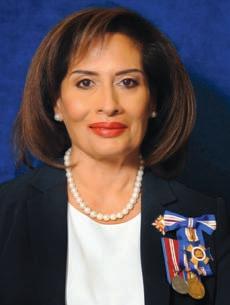

On behalf of His Majesty the King, I welcome everyone attending the 15th edition of the Banff International String Quartet Competition (BISQC).
Competing at BISQC requires an exceptional combination of commitment, technical skill and musical sensitivity. Ever since 1983, Banff has provided a stage for these elite performers to showcase their talents, and to cultivate new audiences for this hallowed but still vital musical format—and help it evolve into the 21st century.
As Alberta’s Lieutenant Governor, I am very proud that our province is the place where this exciting confluence of musicians, audiences and supporters takes place. It has always seemed to me that the Rocky Mountains are an appropriately majestic backdrop for such an event, and I hope that the musicians find inspiration in their vast and timeless beauty.
I welcome all of this week’s artists to our wonderful province, and hope this competition is merely the beginning of an illustrious career.

Her Honour, the Honourable Salma Lakhani AOE, B.Sc., LLD (hon) Lieutenant Governor of Alberta
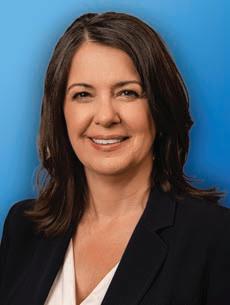
On behalf of the Government of Alberta, it is my pleasure to welcome everyone to Alberta for the 15th annual Banff International String Quartet Competition.
Every three years, young musicians gather in the beauty of Alberta’s Rocky Mountains to showcase their talents and compete for prizes and career opportunities. This event offers seven days of exceptional performances in an extraordinary setting, surrounded by the rich culture of the Banff Centre for Arts and Creativity and Alberta’s famous western hospitality. I extend my very best wishes to the competing musicians as they treat audiences to a world-class classical music experience.
The arts play a vibrant role in our province’s culture and economy, and the Banff Centre has long helped inspire artists and the flourishing of creativity and innovation in Alberta. Thank you and congratulations to all those who have been part of fostering this highly regarded international competition.
Please enjoy the music and your time in Banff.

The Honourable Danielle Smith Premier of Alberta
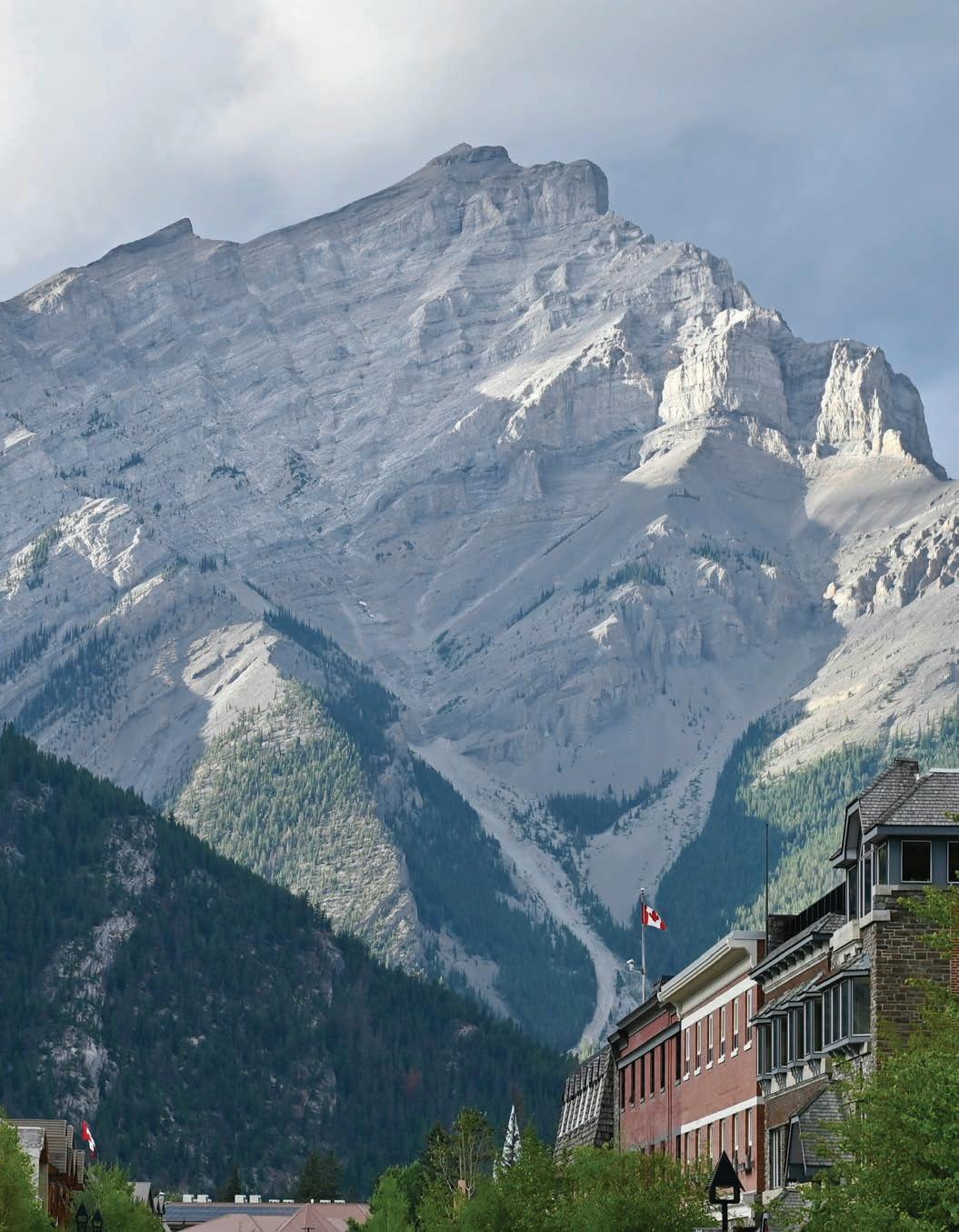
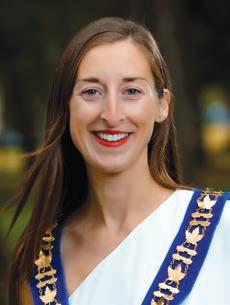
Welcome to Banff! On behalf of the Town of Banff, it is our great pleasure to welcome all participants to the Banff International String Quartet Competition. Whether you are competing, judging, or enjoying the musical experience, we are delighted to have you with us. Banff Centre for Arts and Creativity, a cherished institution in our community, has had the honour of hosting this prestigious event for many years. We are proud to continue this tradition as it helps to enrich the cultural fabric of our beautiful town.
Banff is a special place. We’re a town within a national park, with the privilege of being surrounded by an untouched landscape. Though we only have around 9,000 permanent residents, we welcome approximately four million visitors per year to our town. And it’s not just mountain climbers, skiers, and hikers who flock to the mountains for adventure. We are also delighted by people like yourselves who seek inspiration and motivation from the peaceful and majestic mountain setting.
I hope you get to explore the area while you’re here and see for yourself what draws people from around the world to our small town. There’s something for everyone in Banff, and we’re thrilled to be able to share it with you.
Yours truly,

Corrie DiManno Mayor, Town of Banff

I am thrilled to welcome you to the 15th triennial Banff International String Quartet Competition, a program of Banff Centre for Arts and Creativity.
This is my first competition year since I joined Banff Centre as President and CEO in 2023. But I was lucky to watch the 2022 event as a spectator, and I was simply blown away. The talent of the competitors, the passion of the audience, and the vision of the Competition team combine to make this one of the preeminent events of its kind in the world.
At Banff Centre, we run arts and leadership programs year-round to develop the next generation of creative thinkers and makers. BISQC is a thrilling distillation of that mission, providing up to ten inspiring quartets with mentorship and guidance, putting them on a platform to showcase their talent, and giving audiences a glimpse into the future of the art form.
I wish the best of luck to all our competitors as they aim to become the next BISQC Laureates. In the rush of the competition, remember to stop and take in the beauty of our home on Sacred Buffalo Guardian Mountain and the Treaty 7 territory we’re so honoured to work and live in.
And thank you all, our audience, for lifting up these performers with your support and enthusiasm. I’m so excited you’re a part of the BISQC community and believe so strongly in the power of music, nature, and artistic passion.
Sincerely,

Chris Lorway President and Chief Executive Officer
Photo by Rita Taylor.

To the audiences, musicians, families, friends, and supporters joining us today: Welcome to Banff and to the 2025 Banff International String Quartet Competition.
As chair of the Board of Governors for Banff Centre for Arts and Creativity, I’m honoured you’ve chosen to celebrate nearly 40 years of string quartet excellence with us. This is a beloved event at
Banff Centre, and truly unique: The thrill of a competition, the serene surroundings of Banff National Park, and the intimate atmosphere of campus can only be captured here.
At BISQC, we experience the transformative power of classical music—it evokes our emotions, it opens our minds, and it invites us to sit and reflect and engage. We also celebrate the teamwork, craft, precision, and talent of some of the world’s most amazing young quartets.
I want to thank you for choosing to spend your time with us in support of these artists, Banff Centre, and the future of quartet music.
Sincerely,

Paul Baay Board Chair, Banff Centre for Arts and Creativity

by Donald Lee.

Dear Friends,
A warm welcome to Banff Centre as we present the 15th Banff International String Quartet Competition (BISQC). Over the course of this week, we come together to joyously celebrate the brilliant artistry of the next generation, as the finest young quartets from across the world perform with abandon for audience and jury.
A win at BISQC provides a career launch like no other, with a generous and comprehensive three-year career development program that will bring the
winning quartet to the attention of the world. I remember my time at BISQC in 1992 as a member of the St. Lawrence Quartet and know firsthand how dramatically the win at Banff changed our lives.
Our beautiful campus, on the side of Sacred Buffalo Guardian Mountain in Treaty 7 territory, comes alive as we are at capacity with performers, jurors, composers, managers, broadcasters and passionate music lovers, in our legendary triennial celebration of music and community.
The optimism that the young quartets bring to our world is amplified by the empowering support they all feel while at Banff Centre. Our work to provide this support is made possible by the generosity of many supporters. To our major supporters, the Azrieli Foundation, Christine and David Anderson, Anonymous, and the many individuals that have generously contributed, my most sincere and profound thanks.
Thank you all for being with us at Banff Centre.
With appreciation,

Barry Shiffman Director of BISQC
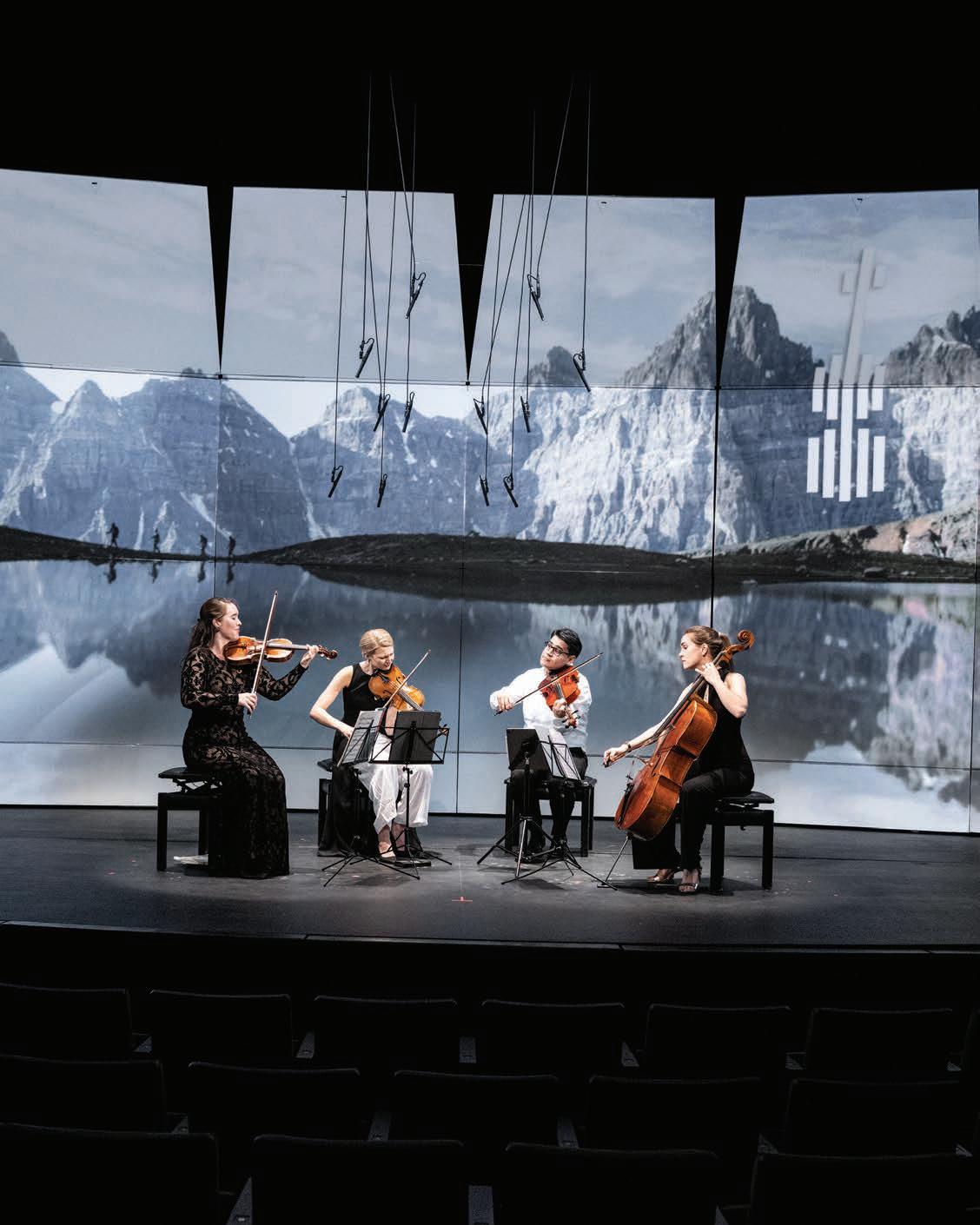
Since 1983 the Banff International String Quartet Competition (BISQC) has celebrated the art of chamber music while providing unparalleled career support for emerging string quartets. Originally intended as a one-time special event to mark the 50th anniversary of Banff Centre for Arts and Creativity, the incredible success of the first competition inspired organizers to make BISQC a triennial Banff Centre event that is now recognized worldwide.
The 15th BISQC will celebrate the talent of up to ten of the world’s best young quartets. Each quartet has been screened by the preliminary jury and now has the opportunity to perform four programs over 12 concerts for a distinguished jury, a keen and educated audience, and for each other. The competition culminates in the Finals on Sunday, when the top three quartets perform.
The 15th version of BISQC includes two special events: an alumni concert featuring 2022 winner Isidore String Quartet joined by jury members Milena Pajaro-van de Stadt and David Ying, as well as participants from the Youth Chamber Music Program; and a special tribute to Austria with an evening of dancing and regional delights at the Viennese Waltz Night. The 15th BISQC is going to be a very special one—from the extraordinary artistry of competitors to the celebration of coming together to experience chamber music and connect with others from around the world.
The list of previous BISQC winners reads a “who’s who” of the world’s most beloved and outstanding quartets:
1983 Colorado Quartet
1986 Franciscan Quartet
1989 Quatuor Manfred
1992 St. Lawrence String Quartet
1995 Amernet String Quartet
1998 Miró Quartet
2001 Daedalus Quartet
2004 Jupiter String Quartet
2007 Tinalley String Quartet
2010 Cecilia String Quartet
2013 Dover Quartet
2016 Rolston String Quartet
2019 Marmen Quartet Viano Quartet co-winners
2022 Isidore String Quartet
Applications from quartets were received from around the world then reviewed and scored by three preliminary jurors: Ayane Kozasa, Guillaume Sutre, and Joshua Gindele.
Following an extensive review of the initial scores, Barry Shiffman, Director of BISQC, and Dr. Moses Renert, BISQC Mathematician, led the preliminary jurors through a comprehensive review of the process of selecting the competing quartets.
The competition is open to string quartets whose members are under the age of 35 on September 1, 2025.
The quartets are asked to submit a high-quality unedited recording containing two contrasting movements of selected Haydn, Mozart, or Beethoven quartets; the first movement of a quartet from the romantic or nationalist repertoire of the 19th century, or another from a select list; and a complete 20th century work. Almost an hour’s worth of music, the repertoire shows the quartet’s range and ability. Once the invited quartets had confirmed their participation, the names of the quartets were announced to audiences and the world during a livestreamed event on April 30, 2025. Travel, accommodations, and meals are provided by Banff Centre and BISQC to ensure that each quartet can attend the competition.
While at Banff Centre, each of the competing quartets perform programs they have created through a combination of selections from a specific, yet extensive, repertoire list and music of their own choosing that highlights their strengths as a quartet. These works are performed during four distinct rounds: 21st Century Haydn Round (Monday and Tuesday), Romantic Round (Wednesday, and Thursday), Kati Agócs World Premiere Round (Friday), and Beethoven/Schubert + 20th Century Round (Saturday).
The seven-member competition jury then chooses three quartets to advance to the fifth and final round on Sunday, August 31. The competition jury voting is completed under the guidance of the BISQC Official Mathematician, Dr. Moses Renert, who is recognized for his expertise in designing similar jury voting procedures for other competitions as well as BISQC. The BISQC scoring system, based on the “Optimal Jury Scoring System” (copyright 459777) by Dr. Ernst Enns and Dr. Moses Renert, ensures absolute fairness to all competing quartets.

The Competition Jury has these tasks:
1. To choose the winner of the R.S. Williams & Sons Haydn Prize for the best performance of a Haydn quartet.
2. To choose the winner of the Canadian Commission Prize, in honour of the R.S. Williams & Sons Company for the best performance of the Kati Agócs World Premiere.
3. To choose three quartets for the Final Round after four rounds of competition.
4. To rank the three prize winners after the completion of the Final Round.
The criteria for choosing the winning quartets are:
1. The winning quartet should be ready to take full advantage of an international performing career, commensurate with the career development program of the competition.
2. The winning quartet should have an abundance of technical skill and a unique artistic voice and presence.
Immediately after the Final Round is completed, the Jurors convene for a voting session.
The Official Mathematician constructs a weighted ranking using the following percentages:
Performance of the Haydn quartet: 13%
Performance of the 21st Century quartet: 7%
Performance of the Romantic quartet: 13%
Performance of the Kati Agócs World Premiere: 7%
Performance of the Beethoven or Schubert quartet: 13%
Performance of the 20th Century quartet: 13%
Performance of the Finals round: 20%
Overall impression of all competition rounds: 14%
Full voting procedures and Official Rules and Regulations can be found at banffcentre.ca/bisqc.

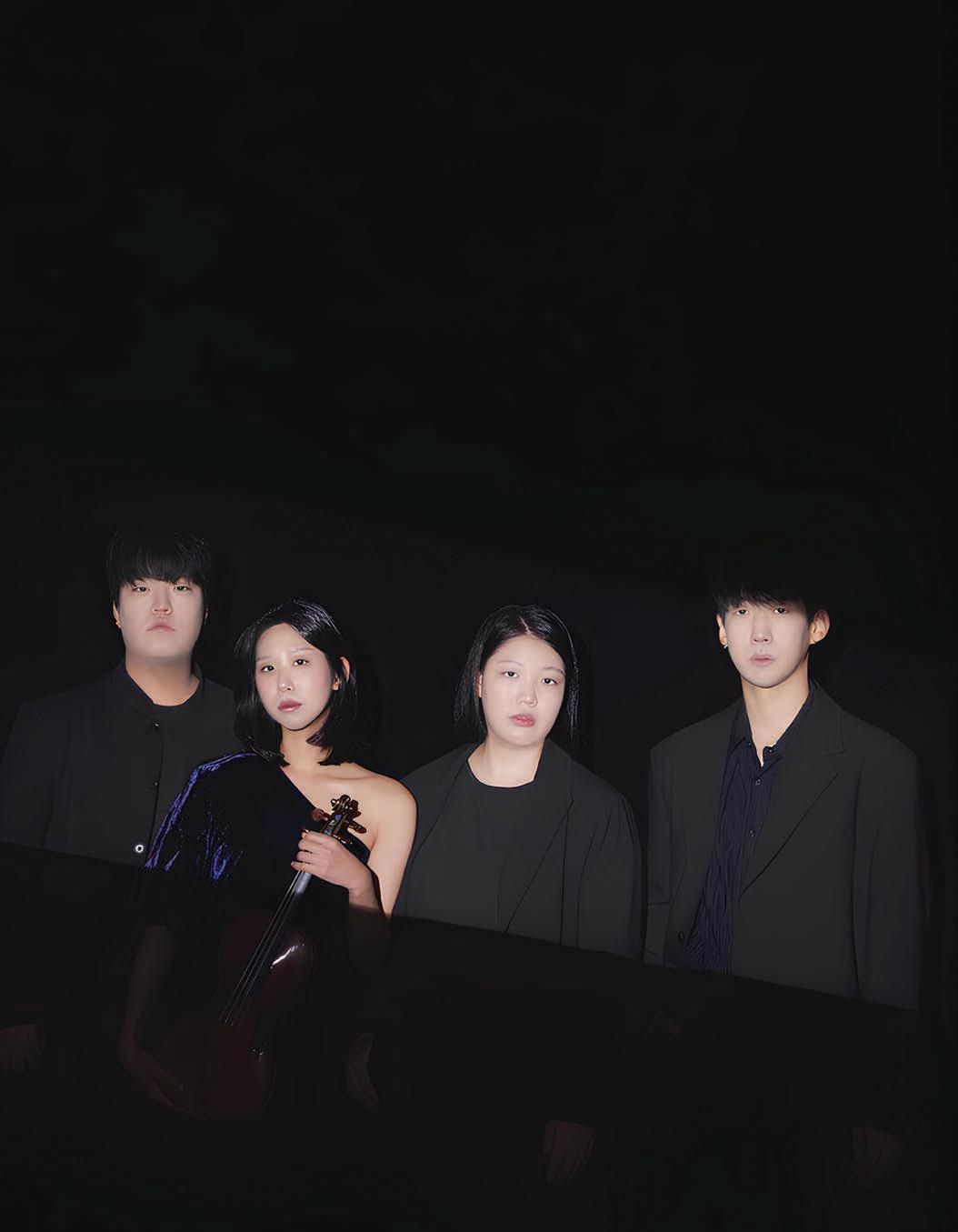
Founded in September 2019, Arete Quartet unanimously passed the Kumho Art Hall Young Chamber Concert audition the same year and made its debut in September 2020 at Kumho Art Hall Yonsei University. After studying with Jaeyoung Kim, first violin of the Novus Quartet, the young quartet performed in various venues in Korea before moving to Munich, Germany, to study with Christoph Poppen at the Hochschule für Musik und Theater.
During its young career, the Arete Quartet has already won a number of important prizes: First prize at the Prague Spring International Music Competition (2021), first prize at the Salzburg Mozart International Competition (2023) and first prize at the Lyon International Chamber Music Competition (2024).
At the 2024 Premio Paolo-Borciani Competition in Reggio Emilia, the quartet reached the third round but was unable to continue performing due to a medical emergency.
Nevertheless, the jury of the Premio Paolo-Borciani Competition awarded the quartet a special prize for “the unique voice it showed during the first three rounds of the 2024 Premio Paolo-Borciani.”
In addition, the Fondazione I Teatri and ProQuartet European Chamber Music Centre announced support for the Arete Quartet during their complex moment.
Chaeann Jeon she/her, violin Eunjoong Park he/him, violin Yoonsun Jang she/her, viola Seonghyeon Park he/him, cello
linkbio.co/aretequartet
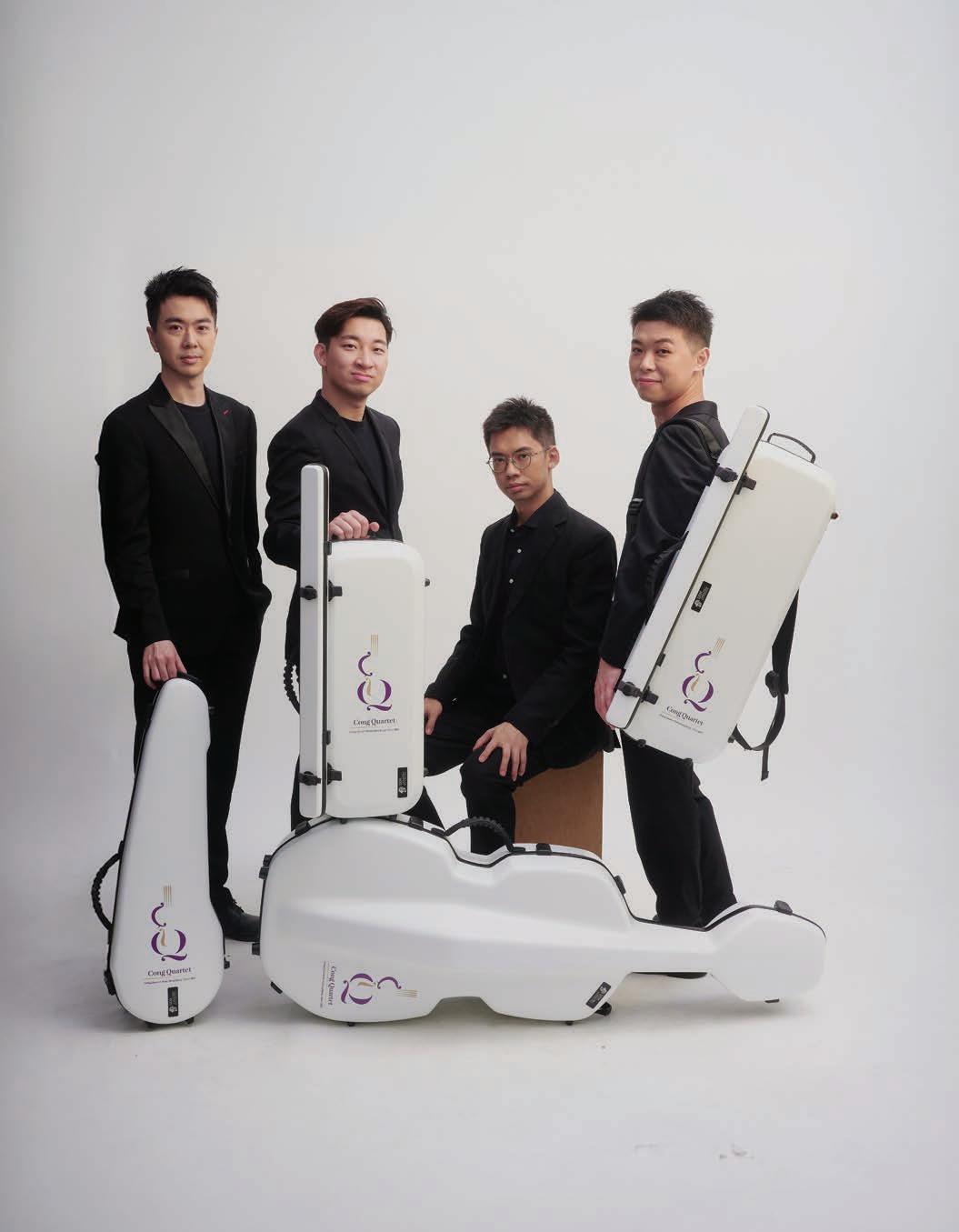
Francis Yiu-Ting Chik he/him, violin
Hiu-Sing Fan he/him, violin
Caleb Wong he/him, viola
Yan Ho Cheng he/him, cello
congquartet.com
Formed at Indiana University in 2015, Cong Quartet recently served in the 2023 artistic residency of Musique à Flaine and was the Ensemble-in-Residence at the Chinese University of Hong Kong (CUHK) from 2019–22. The quartet is part of the Nederlandse Strijkkwartet Academie (NSKA), a musical partner of Domaine de La Garde in France, and a member of Le Dimore del Quartetto in Italy.
Drawing from the mentorship of the Pacifica Quartet at Jacobs School of Music, Ivan Chan at the Hong Kong Academy for Performing Arts, the Quatuor Danel and Quatuor Ysaÿe in Europe, Cong Quartet’s journey was fueled by top prize wins at the 2024 International Music Competition Triomphe de l’Art in Brussels, 2022 Virtuoso & Belcanto’s Chamber Music Competition in Italy, and several other international chamber music competitions. The quartet has participated in many chamber music festivals and institutes, such as the Accademia Internazionale di Musica di Cagliari, Juilliard String Quartet Seminar, Robert Mann String Quartet Institute, Heifetz International Music Institute, Encore Chamber Music, the Harpa International Music Academy, Madeline Island Chamber Music, Music in PyeongChang, the Ozawa International Chamber Music Academy, as well as the European Chamber Music Academy (ECMA) and Musethica. They have performed with world-renowned artists such as the Borromeo Quartet, Quatuor Danel, Yovan Markovitch, Enrico Pace and Yuri Bashmet among many others.
Cong Quartet believes that the humanistic experience of chamber music is a treasure to the community and wishes to promote chamber repertoire from their cultural background.
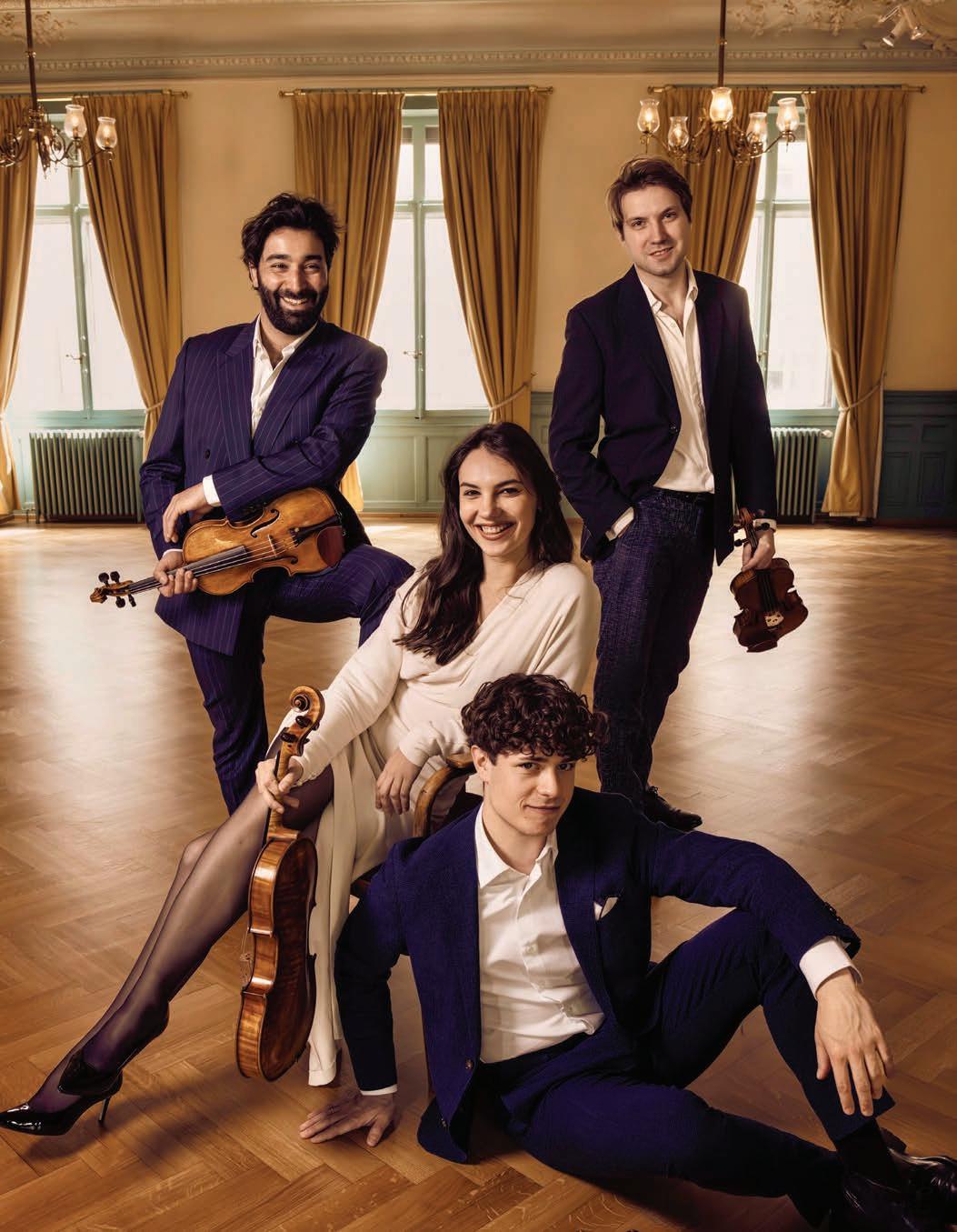
Founded in 2017, the Elmire Quartet was awarded Second Prize at the prestigious Geneva Competition, as well as the special Fondation Etrillard Prize for the most remarkable artistic project.
The quartet has already performed in major venues such as the Philharmonie de Paris, Victoria Hall in Geneva, the Philharmonie Luxembourg, and La Grange au Lac in Évian. Guided by the mentorship of the Modigliani, Ysaÿe, Belcea, and Ébène quartets, the Elmire Quartet is a resident artist at the Singer-Polignac Foundation, the Queen Elisabeth Music Chapel, a ProQuartet grand resident, a Spedidam Generation Artist, and a laureate of the Banque Populaire Foundation.
Recently, the Elmire Quartet has performed at the prestigious Alte Oper in Frankfurt, the 30th La Folle Journée in Nantes, Salle Cortot, the Tokyo International Forum, MUCH Music Chapel in Waterloo, the International Festival of La Roque d’Anthéron, and the Philharmonie de Paris.
David Petrlik he/him, violin Yoan Brakha he/him, violin Hortense Fourrier she/her, viola Rémi Carlon he/him, cello
quatuor-elmire.com

Gyurim Kwak she/her, violin
Fuga Miwatashi she/her, violin
Simon Rosier he/him, viola
Tzu-Shao Chao he/him, cello
hanaquartet.com
The Quartett HANA was founded in 2019 at the Munich University of Music and Performing Arts (HMTM). The name of the quartet reflects the home countries of its members: “HANA” means “flower” in Japanese and “unity” in Korean.
They are prize winners at multiple competitions, such as the Geneva International Music Competition 2023, where they received the second prize. Furthermore, they won the third prize at the Carl Nielsen International Chamber Music Competition 2023, a special prize “Förderpreis Jeunesse Musicales Deutschland” at the ARD International Music Competition and the third prize at the Felix Mendelssohn Bartholdy University Competition in Berlin. In 2024 they took part at the Trondheim International Chamber Music Competition Academy.
The quartet has performed with many renowned artists, including Itamar Golan, Sarah McElravy, François Kieffer, Margarita Höhenrieder, and Michael Endres. Recent performances have been at the Mozartfest Würzburg and the Groba Festival in Spain and at the Heidelberger Frühling Streichquartettfest in 2025.
The quartet has been studying with Prof. Raphaël Merlin and the Quatuor Ébène at the HMTM since 2021 and with Prof. Heime Müller at the Musikhochschule Lübeck since 2024. They work regularly with Prof. Eberhard Feltz and Prof. Dirk Mommertz (Fauré Quartett).
Furthermore, they have participated in masterclasses by Prof. Oliver Wille and Prof. William Coleman (Kuss Quartett), Prof. Gerhard Schulz and Prof. Günter Pichler (Alban Berg Quartett) and Quatuor Voce.
The two violinists Gyurim Kwak and Fuga Miwatashi alternate in the role of first violin.

The Quartet KAIRI is a Salzburg-based string quartet currently studying under Professor Rainer Schmidt (Hagen Quartett) and Professor Cibrán Sierra Vázquez (Cuarteto Quiroga) at the Universität Mozarteum Salzburg. They began working as an ensemble during their studies at the Tokyo College of Music under the guidance of Professor Saiko Azuma.
In winter 2023, Chinese violist Jiliang Shi joined the quartet’s founding members: Taiga Sasaki, Yu Mita, and Hotaka Sakai.
In January 2024, the Quartet KAIRI were invited to collaborate with the Salzburg Marionette Theatre during the Mozartwoche Music Festival. Additionally, they were also part of the Fuji Mountain Music Festival, during which they performed with the renowned clarinettist Peter Schmidl (Former Principal Clarinetist of the Vienna Philharmoniker).
In the fall of 2024, Quartet KAIRI won first prize at the International Competition Premio Annarosa Taddei in Rome.
They also received second prize (first prize not awarded) at the Japan Classical Music Competition in Tokyo.
They have participated in numerous masterclasses by renowned artists such as Günter Pichler during the Schleswig-Holstein Music Festival and Jonathan Brown at the Guadix International String Quartet Seminar.
The word “Kairi” (Japanese) can be translated as “a sea mile”. The name of the quartet represents the strong will to cross human and musical boundaries of the sea and land in order to make music accessible to everyone despite their background. They strongly believe in the universality of the musical language that can be “spoken” and understood by each and every one of us.
Taiga Sasaki he/him, violin Yu Mita he/him, violin Jiliang Shi he/him, viola Hotaka Sakai he/him, cello
Instagram @quartetkairi
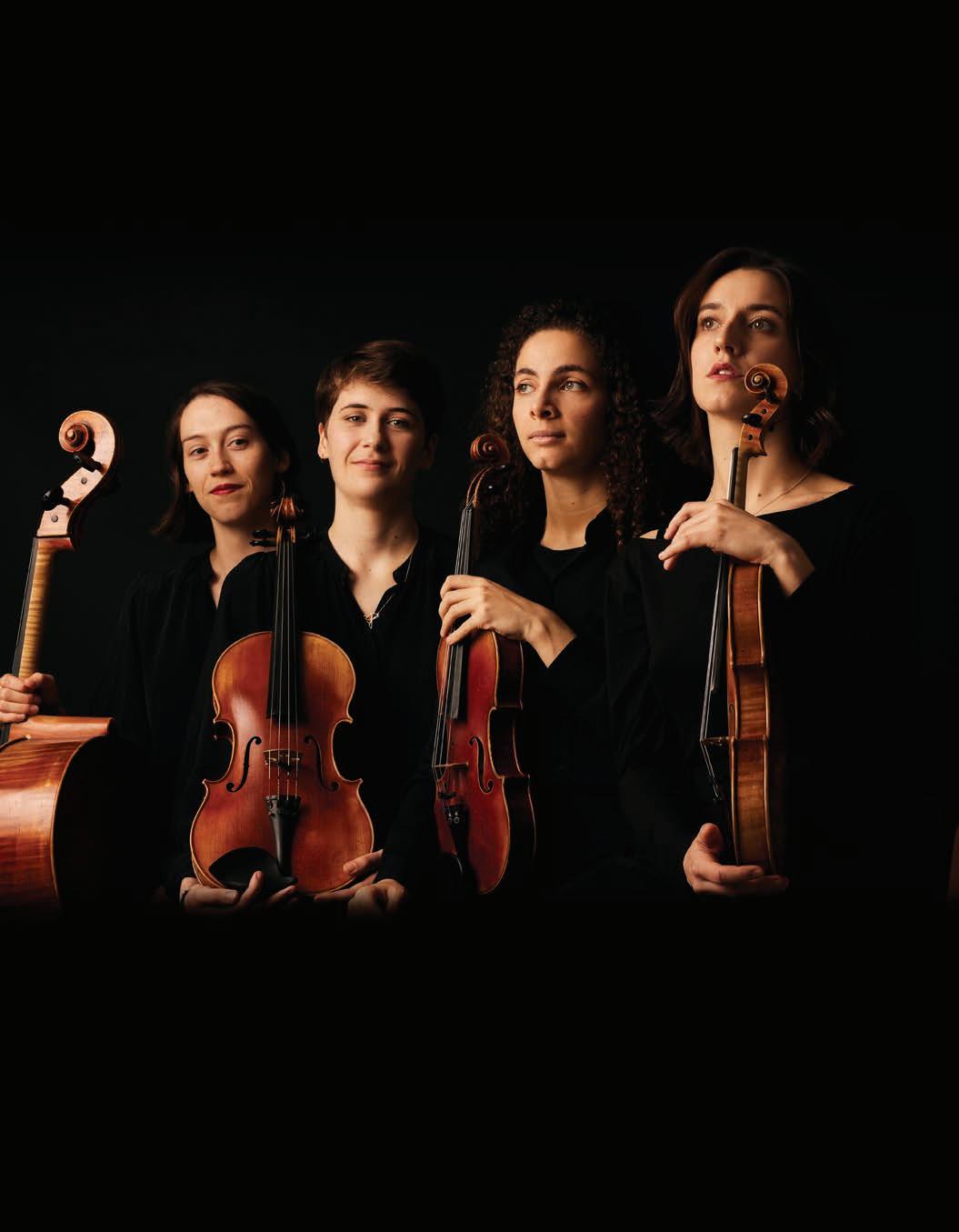
by Photomorty.
Ida Derbesse she/her, violin
Elena Watson-Perry she/her, violin
Claire Pass-Lanneau she/they, viola
Fiona Robson she/her, cello
quatuormagenta.com
The Quatuor Magenta was founded in 2021 and is already performing on France’s most prestigious stages, from the Philharmonie de Paris to the Festival de RadioFrance Montpellier. They were finalists of the 8th Joseph Haydn Chamber Music Competition in Vienna and prizewinners at the 2023 FNAPEC competition and the 2022 Zukunftsklang Competition Stuttgart. November 2024 marked the quartet’s first international tour to Canada, generously supported by the CNM and SPEDIDAM.
The Quatuor Magenta is based in Paris, France, where they are junior artist-inresidence at the Singer-Polignac Foundation and ensemble-in-residence at Proquartet-CEMC. They have been invited to perform at numerous festivals in France, including the Musikfest Parisienne, the Festival de la Chaise-Dieu, Un Temps pour Elles, Un Été en France with Gautier Capuçon and the Quatuor Modigliani’s Festival Vibre!, as well as in Switzerland (Festival de la Collégiale in Neuchâtel) and in Germany (Klangraum Konzerte in Cologne).
Last season, contemporary music had pride of place with Quatuor Magenta’s participation in the Kronos Quartet’s 50 for the Future Marathon at the Philharmonie de Paris’s String Quartet Biennale. Their 2024–25 season included several octet performances alongside the renowned Quatuor Van Kuijk, in partnership with La Belle Saison.
The Quatuor Magenta participated in the inaugural year of the Élite program at the École Normale de Paris, under the mentorship of the Quatuor Modigliani. Other important mentors include the Quatuor Ébène, and Rainer Schmidt of the Hagen Quartet. They are grateful for the support of the Safran Foundation and ADAMI.
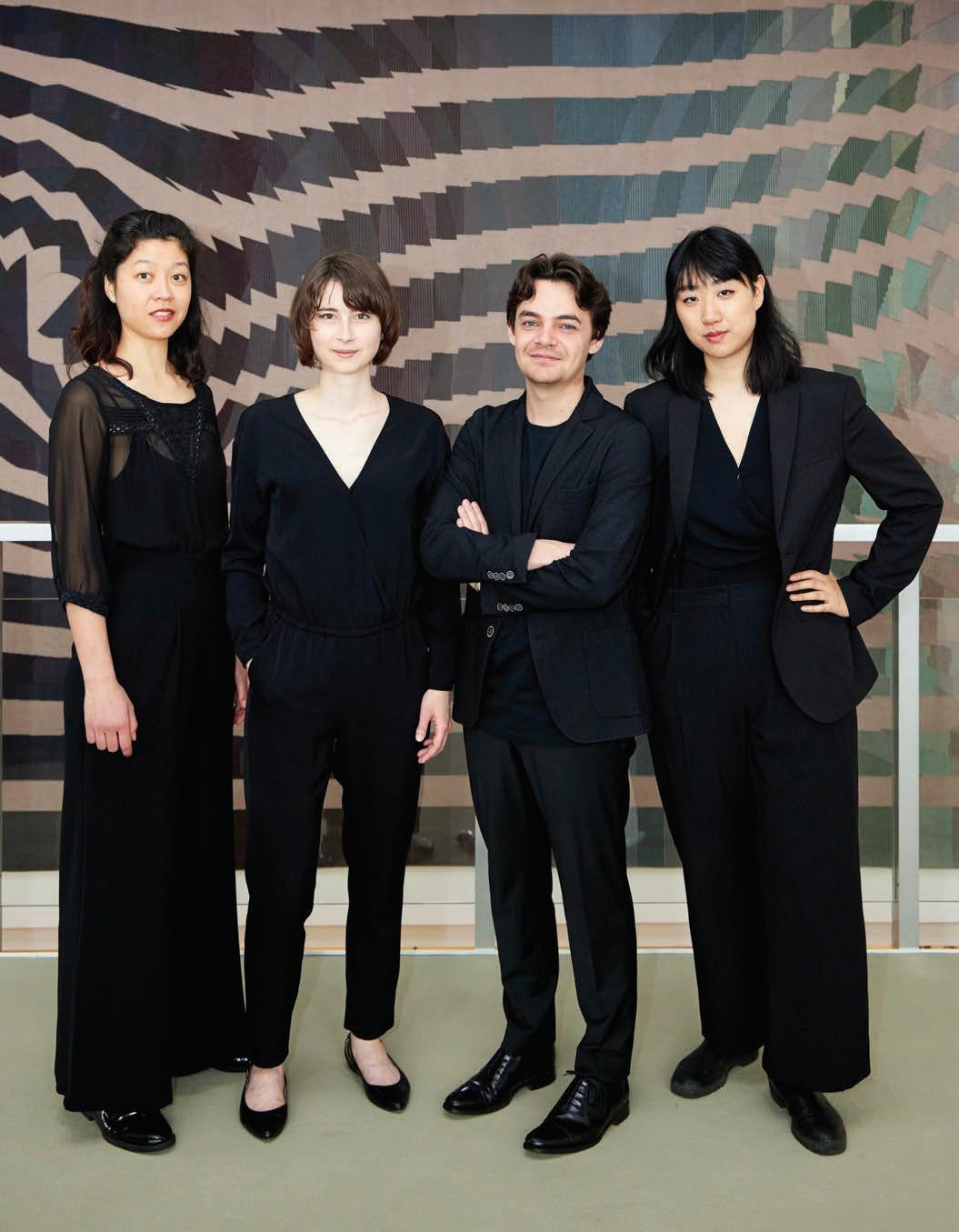
United by their spontaneous and joyful approach to music-making, the four members of the Nerida quartet captivate their audiences with an irresistible energy and sincere interpretations.
A brief initial encounter in chamber music as academists of the Deutsche Kammerphilharmonie Bremen sparked a long-term musical relationship. Their close connection was nurtured during this time by working with a number of great colleagues, conductors and soloists.
The ensemble’s name, inspired by the Nereids of Greek mythology, draws reference to water as a powerful yet flexible element that can constantly take on new forms.
The Nerida quartet has been playing in its current form since 2024, achieving remarkable success in a short time. Most recently, the ensemble was awarded third prize at the Irene Steels-Wilsing Quartet Competition. In January 2024, the ensemble was awarded the “Prize of the Federal President” for the Felix Mendelssohn Bartholdy Hochschulwettbewerb 2024.
Invitations to international music festivals such as the Festival Musikdorf Ernen, Gent Festival van Vlaanderen and the Heidelberger Frühling regularly take the quartet to stages all over Europe.
The quartet is based in Bremen and is currently enrolled at the HMTM Hannover with Prof. Oliver Wille. It has also received tuition from renowned teachers such as Martin Funda, Patrick Jüdt, members of the Artemis Quartet and Cuarteto Casals, Hatto Beyerle and Johannes Meissl through the renowned European Chamber Music Academy.
The quartet has been part of the EUfunded MERITA programme since 2023.
Saskia Niehl she/her, violin
Jeffrey Armstrong he/him, violin
Grace Leehan she/her, viola Nadja Reich she/her, cello
neridaquartet.com
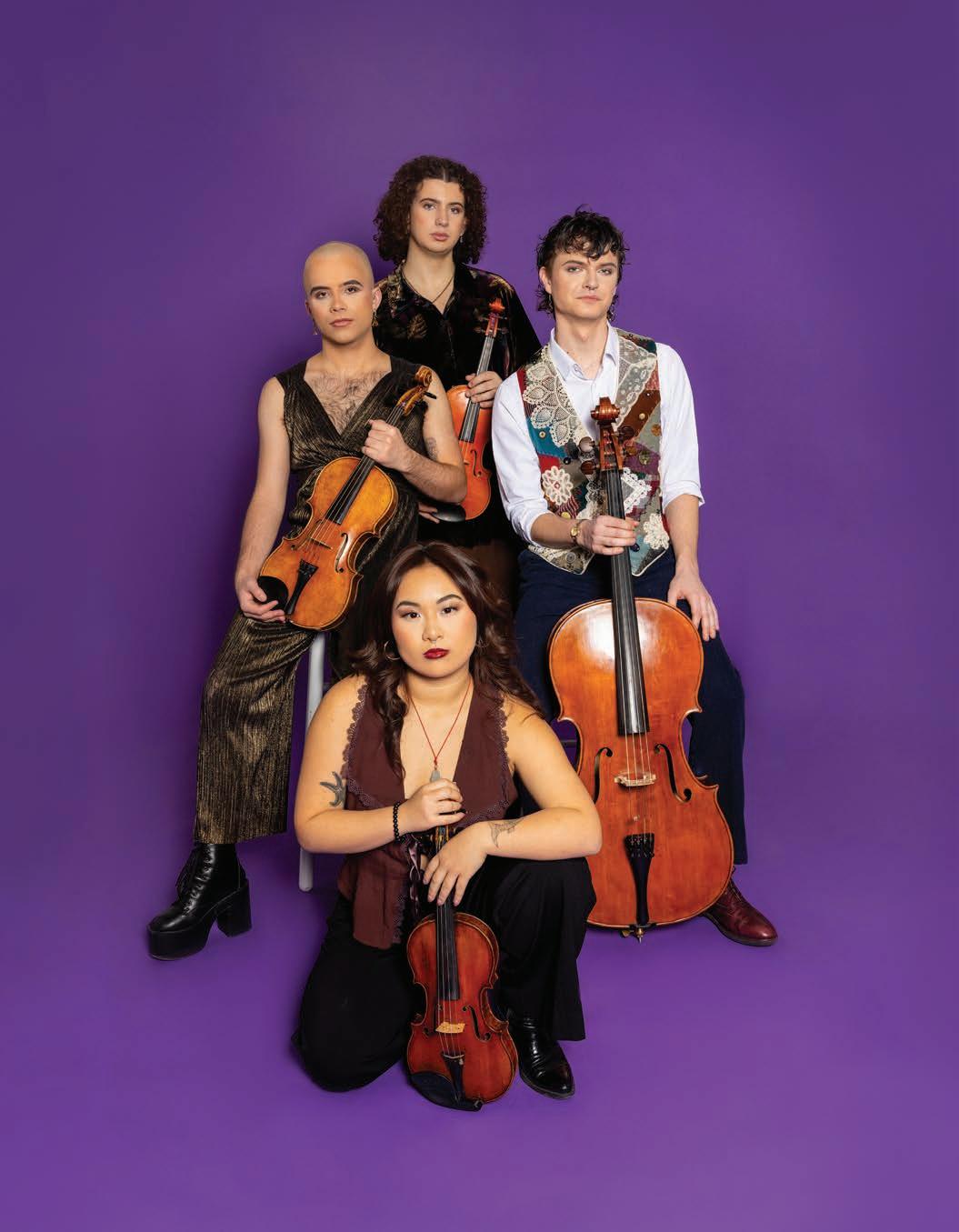
Sarah Ying Ma she/they, violin
Max Ball he/they, violin
Jasper de Boor they/them, viola
Drew Dansby he/him, cello
poiesisquartet.com
The Poiesis Quartet is the 2023 Grand Prize winner of the Fischoff National Chamber Music Competition and winner of the 2024 Concert Artists Guild Competition. Within eight months of their founding at Oberlin Conservatory, they also received Fischoff’s Lift Every Voice Prize as well as Gold Medal and BIPOC Prize at the 2023 St. Paul String Quartet Competition. Poiesis has toured internationally, including in Uruguay in 2023, as well as Italy in 2024 for a residency at the Emilia Romagna Festival. As an ensemble passionate about new music, the recent release of their debut album as we are on the Bright Shiny Things label features world premiere recordings of works by Clint Needham and Richard Stout alongside mezzo-soprano Nancy Maultsby. In the 2024–25 season, they also served as ensemble-in-residence with concertnova, a collective presenting multi-sensorial and multi-disciplinary concert experiences, where they collaborated with composer Sarah Hennies, violinist Benjamin Beilman, and visual artist XUAN.
The Poiesis Quartet is the current Graduate Quartet-in-Residence at the University of Cincinnati CollegeConservatory of Music studying with the Ariel Quartet. As graduates of Oberlin Conservatory, they were previously mentored by Sibbi Bernhardsson of the Pacifica Quartet and the Verona Quartet.
The name Poiesis is derived from the ancient Greek word “ ποιεῖν ”, which means “to make.” Poiesis seeks to program music of all styles and genres with an emphasis on platforming works by emerging and underrepresented composers, creating unique moments of synchronicity and verve in each performance.

The Viatores Quartet is a young string quartet based in Berlin. In 2024 they were awarded first prize at the MendelssohnBartholdy Competition and the prize of the Freunde Junge Musiker. In 2025, the quartet won second prize at the ISW Foundation String Quartet Competition in Heidelberg. The quartet is increasingly in-demand on the concert stage, and has performed at renowned concert venues including the Berlin Philharmonic and Konzerthaus Berlin.
Recent performances include appearances at Villa Musica, Hindemith-Tage, AIMA Festival, Piano Salon Christophori, and Mainau Castle. Upcoming performances will take them to cities such as Cologne, Munich, Düsseldorf, and Trier, as well as to Austria, Turkey, and Great Britain. They will also perform at the Hitzacker Festival in 2025, the Schumann Foundation Frankfurt, and the Schwetzingen Festival in 2026. This year will also see the production and release of their first CD album.
The Viatores Quartet was founded in 2023 at the Hanns Eisler HfM Berlin. The group is currently studying with Professor Tabea Zimmermann at the HFMDK Frankfurt and at the HMTMH Hannover with Professor Oliver Wille. They have also received artistic guidance from renowned musicians such as Christian Tetzlaff, Nora Chastain, and Areta Zhula of Juilliard String Quartet.
The quartet takes its name from the Latin term “viatores”, which means “travellers.” As the name suggests, the quartet proudly represents four different origins and cultures, united by a common goal.
Louisa Staples she/her, violin Johannes Brzoska he/him, violin Gordon K.H. Lau he/him, viola Umut Saglam he/him, cello
viatoresquartet.com
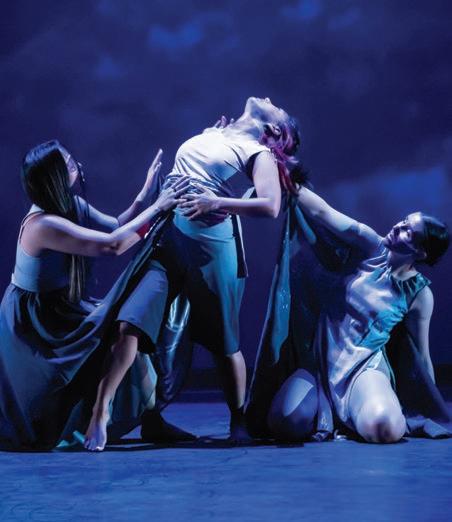
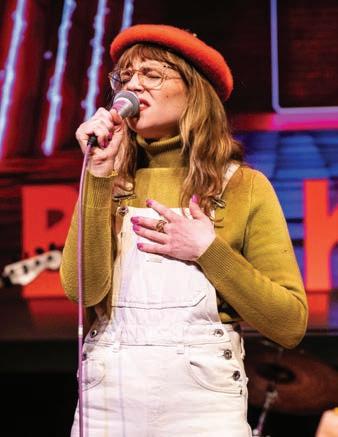
Banff Centre aims to inspire everyone who attends our campus—artists, leaders, and thinkers—to unleash their creative potential.
Explore our arts and leadership programs today.
banffcentre.ca/programs

Jenny Belzberg Theatre
Monday August 25
21st Century Haydn Round
Quartets perform a recital of a Haydn quartet, and a quartet written in 2000 or later.
Concert 1
2:00 p.m.
Concert 2 7:30 p.m.
Tuesday August 26
21st Century Haydn Round
Quartets perform a recital of a Haydn quartet, and a quartet written in 2000 or later.
Concert 3
10:30 a.m.
Concert 4 2:00 p.m.
Concert 5 7:30 p.m.
Wednesday August 27
Romantic Round Quartets perform a complete quartet from the romantic or nationalistic repertoire of the 19th century.
Concert 6
2:00 p.m.
Concert 7 7:30 p.m.
NOTE: Performances will start on time. Latecomers will be seated at the discretion of the Front of House staff.
For tickets to BISQC 2025 events, contact Banff Centre Box Office at 1.800.413.8368 or visit banffcentre.ca/bisqc.
Thursday August 28
Romantic Round Quartets perform a complete quartet from the romantic or nationalistic repertoire of the 19th century.
Concert 8
10:00 a.m.
Alumni Gala Concert Featuring BISQC winners the Isidore String Quartet and friends.
Concert 9 8:00 p.m.
Alumni Gala Concert generously supported by Christopher R. Head.
Friday August 29
Kati Agócs World Premiere Round
All quartets perform Rapprochement
Concert 10
10:00 a.m.
Saturday August 30
Beethoven/ Schubert + 21st Century Round Quartets perform a movement of Beethoven or Schubert, plus a complete work from the 20th century.
Concert 11
10:00 a.m.
Concert 12 2:00 p.m.
Concert 13 7:30 p.m.
Following jury deliberation, three finalists will be announced via press release.
Sunday August 31
Finals
The three finalists present a program of up to 45 minutes of music, by a minimum of three different composers.
Concert 14 2:00 p.m.
Awards Ceremony
All quartets will be celebrated with prize presentations following jury deliberations. 7:30 p.m.
Day 1
21st Century Haydn Round
Concert 1 2:00 p.m.
NOTES:
String Quartet in C Major, Op. 74 No. 1 (1793)
Allegro (moderato) Andantino (grazioso) Menuetto. Allegro Finale. Vivace
String Quartet No. 5 (2004 – 2005)
String Quartet in D Major, Op. 76 No. 5 (1797)
Allegretto
Largo. Cantabile e mesto Menuetto. Allegro Finale. Presto
String Quartet No. 5 (2004 – 2005)
Franz Joseph Haydn (1732 – 1809)
Pascal Dusapin (b. 1955)
Franz Joseph Haydn (1732 – 1809)
Pascal Dusapin (b. 1955)
String Quartet in C Major, Op. 54 No. 2 (1788)
Vivace Adagio Menuetto. Allegro Finale. Adagio - Presto - Adagio
Entr’acte (2011)
INTERMISSION
String Quartet in B minor, Op. 33 No. 1 (1781)
Allegro moderato Scherzo. Allegro di molto Andante Finale. Presto
String Quartet No. 3, Jagdquartett (2003)
Franz Joseph Haydn (1732 – 1809)
Caroline Shaw (b. 1982)
Franz Joseph Haydn (1732 – 1809)
Jörg Widmann (b. 1973) Day 1
21st Century Haydn Round
Concert 2 7:30 p.m.
NOTES:
TUESDAY, AUGUST
Day 2
21st Century Haydn Round
Concert 3 10:30 a.m.
NOTES:
String Quartet in C Major, Op. 74 No. 1 (1793)
Allegro (moderato)
Andantino (grazioso)
Menuetto. Allegro
Finale. Vivace
Floral Fairy (2003)
Franz Joseph Haydn (1732 – 1809)
Toshio Hosokawa (b. 1955)
Many Many Cadences (2015) Sky Macklay (b. 1988)
String Quartet in D Major, Op. 71 No. 2 (1793)
Adagio - Allegro
Adagio (cantabile)
Menuetto: Allegretto
Finale: Allegretto
Franz Joseph Haydn (1732 – 1809)
TUESDAY,
String Quartet in E flat Major, Op. 33 No. 2 (1781)
Allegro moderato Scherzo: Allegro Largo Presto
String Quartet No. 7, Consensus (2019)
Franz Joseph Haydn (1732 – 1809)
21st Century Haydn Round
Concert 4 2:00 p.m.
NOTES:
Lawrence Dillon (b. 1959)
TUESDAY,
Day 2
21st Century Haydn Round Concert 5 7:30 p.m.
NOTES:
String Quartet in C Major, Op. 20 No. 2 (1772)
Moderato
Adagio
Minuetto. Allegro
Fuga a 4 Soggetti. Allegro
String Quartet No. 3, Jagdquartett (2003)
String Quartet in C Major, Op. 76 No. 3 (1797)
Allegro
Menuetto. Allegro Finale. Presto
String Quartet No. 5 (2004 – 2005)
Franz Joseph Haydn (1732 – 1809)
Jörg Widmann (b. 1973)
Franz Joseph Haydn (1732 – 1809)
Pascal Dusapin (b. 1955)

WEDNESDAY,
Romantic Round
Concert 6 2:00 p.m.
NOTES:
String Quartet No. 2 in A minor, Op. 13 (1827)
Adagio - Allegro vivace
Adagio non lento
Intermezzo: Allegretto con moto - Allegro di molto
Presto - Adagio non lento
String Quartet in G minor, Op. 10 (1893)
Animé et très décidé
Assez vif et bien rythmé
Andantino, doucement expressif
Très modéré
INTERMISSION
String Quartet No. 3 in B flat Major, Op. 67 (1875)
Vivace
Andante
Agitato (Allegretto non troppo) - Trio - Coda
Poco Allegretto con Variazioni
Felix Mendelssohn (1809 – 1847)
Claude Debussy (1862 – 1918)
Johannes Brahms (1833 – 1897)
WEDNESDAY,
String Quartet No. 6 in F minor, Op. 80 (1847)
Allegro vivace assai
Allegro assai
Adagio
Finale: Allegro molto
String Quartet No. 1 in A minor, Op. 41 (1842)
Introduzione. Andante espressivo
Scherzo. Presto-Intermezzo
Adagio
Presto
INTERMISSION
String Quartet in G minor, Op. 10 (1893)
Animé et très décidé
Assez vif et bien rythmé
Andantino, doucement expressif
Très modéré
Felix Mendelssohn (1809 – 1847)
Day 3
Romantic Round
Concert 7 7:30 p.m.
NOTES:
Robert Schumann (1810 – 1856)
Claude Debussy (1862 – 1918)
THURSDAY,
Day 4
Romantic Round
Concert 8
10:00 a.m.
NOTES:
String Quartet No. 3 in A Major, Op. 41 (1842)
Andante espressivo - Allegro molto moderato
Assai agitato - Un poco adagio - Tempo risoluto
Adagio molto
Finale: Allegro molto vivace - Quasi Trio
String Quartet in E flat Major Op. 44, No. 3 (1838)
Allegro vivace
Scherzo: Assai leggiero vivace
Adagio non troppo
Molto allegro con fuoco
INTERMISSION
String Quartet in E minor Op. 44, No. 2 (1837)
Allegro assai appassionato
Scherzo: Allegro di molto
Andante
Presto agitato
Robert Schumann (1810 – 1856)
Felix Mendelssohn (1809 – 1847)
Felix Mendelssohn (1809 – 1847)
Isidore String Quartet
Adrian Steele, violin
Phoenix Avalon, violin
Devin Moore, viola
Joshua McClendon, cello
Barry Shiffman, violin
Yoanna Haeun Jang, violin
Harrison Meng, viola
David Ying, cello
Joel Quarrington, bass
Last Round (1996)
Barry Shiffman, viola
Isidore String Quartet
K’vakarat (1994)
Osvaldo Golijov (b. 1960)
Alumni Gala
Concert 9 Non-competition Event 8:00 p.m.
Alumni Gala Concert generously supported by Christopher R. Head
NOTES:
Osvaldo Golijov (b. 1960)
Isidore String Quartet
Milena Pajaro-van de Stadt, viola
David Ying, cello
String Sextet No.1 in B-flat Major, Op. 18 (1860)
Allegro ma non troppo Andante, ma moderato Scherzo: Allegro molto Rondo: Poco allegretto e grazioso
Johannes Brahms (1833 – 1897)
Kati Agócs World Premiere Round
Concert 10 10:00 a.m.
NOTES:
Kati Agócs RAPPROCHEMENT
All quartets perform the world premiere of Rapprochement by Kati Agócs.
Viatores Quartet Berlin
Arete Quartet Seoul
Cong Quartet Hong Kong
Quatuor Magenta Paris
Quatuor Elmire Paris
INTERMISSION
Quartett HANA Munich
Nerida Quartet Bremen
Quartet KAIRI Salzburg
Poiesis Quartet Cincinnati

SATURDAY, AUGUST
Day 6
Beethoven/Schubert + 20th Century Round
Concert 11 10:00 a.m.
NOTES:
String Quartet No. 14 in D minor, D. 810 (1824)
Allegro
String Quartet No. 1 “The Kreutzer Sonata” (1923)
Adagio - Con moto
Con moto
Con moto - Vivo - Andante
Con moto - (Adagio) - Più mosso
String Quartet No. 7 in F Major, Op. 59, No. 1 (1806)
Allegro
String Quartet No. 1, ‘Métamorphoses nocturnes’ (1954)
Allegro grazioso - Vivace, capriccioso
A tempo - Adagio, mesto - Presto
Franz Schubert (1797 – 1828)
Leoš Janáček (1854 – 1928)
Ludwig van Beethoven (1770 – 1827)
Molto sostenuto. Andante tranquillo - Piu mosso
György Ligeti (1923 – 2006)
Tempo di Valse, moderato, con eleganza, un poco capriccioso
INTERMISSION
String Quartet No. 15 in G Major, D. 887 (1826)
Allegro molto moderato
Lyric Suite (1925 – 1926)
Allegretto gioviale
Andante amoroso
Allegro misterioso - Trio estatico
Adagio appassionato
Presto delirando - Tenebroso
Largo desolato
Franz Schubert (1797 – 1828)
Beethoven/Schubert + 20th Century Round
Concert 11 10:00 a.m.
Alban Berg (1885 – 1935)
NOTES:
Day 6
Beethoven/Schubert + 20th Century Round
Concert 12 2:00 p.m.
NOTES:
String Quartet No. 9 in C Major, Op. 59, No. 3 (1806)
Andante con moto - Allegro vivace
String Quartet No. 2, Sz. 67 (1915 – 1917)
Moderato
Allegro molto capriccioso Lento
String Quartet No. 7 in F Major, Op. 59, No. 1 (1806)
Allegro
String Quartet No. 5, Op. 32 (1923)
Lebhafte Halbe
Sehr langsam, aber immer fließend
Kleiner Marsch. Vivace, sempre crescendo Passacaglia - Fugato (so schnell wie möglich)
INTERMISSION
Ludwig van Beethoven (1770 – 1827)
Béla Bartók (1881 – 1945)
Ludwig van Beethoven (1770 – 1827)
Paul Hindemith (1895 – 1963)
String Quartet No. 8 in E minor, Op. 59, No. 2
Allegro
String Quartet No. 3, Sz. 85 (1927)
Prima parte: Moderato Seconda parte: Allegro Ricapitulazione della prima parte: Moderato Coda: Allegro molto
Ludwig van Beethoven (1770 – 1827)
Day 6
Beethoven/Schubert + 20th Century Round
Concert 12 2:00 p.m.
Béla Bartók (1881 – 1945)
NOTES:
SATURDAY,
Day 6
Beethoven/Schubert + 20th Century Round
Concert 13 7:30 p.m.
NOTES:
String Quartet No. 15 in G Major, D. 887 (1826)
Allegro molto moderato
String Quartet No. 1 in D Major, Op. 25 (1941)
Andante sostenuto - Allegro vivo
Allegro con slancio
Andante calmo
Molto vivace
String Quartet No. 9 in C Major, Op. 59, No. 3 (1806)
Andante con moto - Allegro vivace
String Quartet No. 5, Sz. 102 (1934)
Allegro
Adagio molto
Scherzo: alla bulgarese
Andante
Finale: Allegro vivace
INTERMISSION
Franz Schubert (1797 – 1828)
Benjamin Britten (1913 – 1976)
Ludwig van Beethoven (1770 – 1827)
Béla Bartók (1881 – 1945)
String Quartet No. 13 in A minor, D. 804 (1824)
Allegro ma non troppo
String Quartet No. 1 “The Kreutzer Sonata” (1923)
Adagio - Con moto
Con moto
Con moto - Vivo - Andante
Con moto - (Adagio) - Più mosso
Franz Schubert (1797 – 1828)
Beethoven/Schubert + 20th Century Round
Concert 13 7:30 p.m.
Leoš Janáček (1854 – 1928)
NOTES:

Day 7
Final Round Concert 14 2:00 p.m.
During the Final Round, three quartets take the stage to perform a creatively curated 45-minute program of music.
At 7:30 p.m. the competition winners will be announced and the awards and special prizes presented.
NOTES:
Sunday August 24
Welcome
BISQC package audience welcome event with a special presentation by Denis Brott on what you will hear in Round 1.
7:30 – 9:00 p.m.
Kinnear Centre, Cenovus Great Hall
Monday August 25
Mark Steinberg
Training Young Quartets
Mentor-in-Residence
Mark Steinberg in conversation with director Barry Shiffman and select BISQC jury members.
Lecture
11:00 a.m. – 12:00 p.m.
Kinnear Centre, Cenovus Great Hall
Tuesday August 26
Mentor-in-Residence Program supported in honour of the R.S. Williams & Sons Company. Lecture series generously supported by Ernie and Sandra Green.
Adrian Anantawan Violinist, educator, and disability advocate Adrian Anantawan, who was born missing his right hand, shares the lessons he learned along the way of how to create inclusive practices at the intersections of music performance, education, and disability, with the goal of lifting the ceiling of human potential for all.
Lecture
9:00 – 10:00 a.m.
Kinnear Centre, Cenovus Great Hall
Wednesday August 27
Free time to enjoy your surroundings.
Note that lunch in Vistas is NOT included in packages today so we encourage you to go exploring!
Morning until 2:00 p.m. concert.
Open Masterclass
Students from the Youth Chamber Music Program receive coaching from BISQC juror Eckart Runge.
Masterclass 4:30 p.m.
Jenny Belzberg Theatre
These events are open to those audience members who have purchased BISQC packages such as our full-week or weekend on-campus buyers, as well as our passport package holders, unless otherwise noted.
Thursday August 28
Free time to enjoy your surroundings.
After lunch until 8:00 p.m. concert
Friday August 29
Composer of the Canadian Commissioned work Rapprochement in discussion with director Barry Shiffman.
Lecture 9:00 – 9:30 a.m. Jenny Belzberg Theatre
This lecture is open to all who have purchased tickets to the concert that follows.
Free time to enjoy your surroundings.
After lunch through remainder of day.
* Viennese Waltz Night is a separate purchase from packages. For questions or further details, see the BISQC Audience Info Desk in the Jenny Belzberg Theatre lobby.
Saturday August 30
Full day of concerts followed by a late night press release announcing the three finalists.
Sunday August 31
Denis Brott
The life and legacy of Russian-born American cellist Gregor Piatigorsky is examined by Canadian cellist and educator Denis Brott.
Lecture 11:00 a.m. – 12:00 p.m.
Kinnear Centre, Cenovus Great Hall
Dance Lesson 3:30 – 4:30 p.m.
Waltz Night 8:00 – 10:00 p.m.
Rolston Recital Hall

One quartet will be awarded a customdesigned, three-year artistic and career development program which includes:
• $25,000 CDN cash prize;
• Winner’s Concert Tours in careerbuilding markets in Europe and North America, arranged by Banff Centre;
• A two-week residency at Banff Centre including a recording produced by Banff Centre;
• Coaching, career guidance, and mentorship;
• Southern Methodist University Peak Fellowship Ensemble-inResidence Prize which includes a one-year paid visiting residency at the Meadows School involving performances, coaching, and mentorship. This residency is valued at over $110,000 CDN;
• A residency with the Esterházy Foundation, including concerts at Haydn Hall in Eisenstadt and the Lucerne Festival;
• An opportunity for a two-week Chamber Music Residency at the prestigious Britten Pears Arts in England.
2nd Place Laureates
• $12,000 CDN cash prize;
• A creative residency at Banff Centre including coaching and mentorship opportunities.
3rd Place Laureates
• $8,000 CDN cash prize;
• A creative residency at Banff Centre including coaching and mentorship opportunities.
The R.S. Williams & Sons Haydn Prize
$4,000 CDN for the best performance of a quartet by Haydn from Round 1.
The Canadian Commission World Premiere Prize, in honour of the R.S. Williams & Sons Company
$4,000 CDN for the best performance in Round 3 of the commissioned quartet by Kati Agócs.
Christine and David Anderson Prizes
In recognition of the extraordinary level of artistry that BISQC attracts, all quartets not advancing to the finals will receive a $5,000 CDN prize to support their emerging careers.
The DC Anderson Family Foundation in partnership with the Grenadines Initiative
An all-expense paid 10-day residency and outreach opportunity.
BISQC is proud of the many partnerships developed with concert presenters across Europe and North America who have supported laureates by providing performance opportunities for audiences world-wide. The winning quartet of BISQC 2025 will embark on a concert tour arranged in Europe by Konzertdirection Andrea Hampl and in North America by MKI Artists
In Europe, BISQC has concert agreements in principle with:
Strijkkwartet Biënnale, Amsterdam, NL Kammermusik Basel, Basel, CH Konzerthaus Berlin, Berlin, DE University of Bonn, Bonn, DE Konzertverein Bozen, Bozen, IT Meran Musik, Meran, IT
Philharmonische Gesellschaft, Bremen, DE Bruchsaler Schlosskonzerte, Bruchsal, DE Flagey, Brussels, BE Herbstgold Festival, Eisenstadt, AT Festival Mecklenburg-Vorpommern, DE Rheingau Musik Festival, DE Stadt Fulda, Fulda, DE Elbphilharmonie, Hamburg, DE Wigmore Hall, London, UK
Esterházy Foundation, Eisenstadt, AT Lucerne Festival, Lucerne, CH Philharmonie, Paris, FR Mozarteum, Salzburg, AT KunstFreunde, Wiesloch, DE Philharmonie, Essen, DE Kammermusik-Gemeinde, Hannover, DE Deutschlandfunk, Cologne, DE Beethoven-Haus, Bonn, DE Wurzburg, Mozartfest, DE
In North America, BISQC has concert agreements in principle with:
Victoria Summer Music Festival, Victoria, BC
White Rock Concerts, Surrey, BC
ArtSpring, Salt Spring Island, BC
Calgary Pro Musica, Calgary, AB
The Jeffery Concerts, London, ON
Montreal Chamber Music Festival, Montreal, QC
Stanford Live, Stanford, CA
Friends of Chamber Music, Troy, NY
Rockport Chamber Music Festival, Rockport, MA
Fullerton Friends of Music, Fullerton, CA
Kitchener-Waterloo Chamber Music Society, Waterloo, ON
Chamber Music Hamilton, Hamilton, ON
Cheboygan Area Arts Council, Cheboygan, MI
Billings Symphony, Billings, MT
Santa Barbara Museum of Art, Santa Barbara, CA
Port Townsend Chamber Music Series, Port Townsend, WA
Banff International String Quartet Festival, Banff, AB
Music in the Morning, Vancouver, BC
Chamber Music Kelowna, Kelowna, BC
The Coast Recital Society, Sechelt, BC
Kaslo Concert Society, Kaslo, BC
Lyell Gustin Recital Series, Saskatoon, SK
Toronto Summer Music Festival, Toronto, ON Cecilian Chamber Series, Regina, SK
Cecilia Concerts, Halifax, NS
Edmonton Chamber Music Society, Edmonton, AB
Friends of Chamber Music, Vancouver, BC
Maple Ridge Music Society, Maple Ridge, BC
Seattle Chamber Music Society, Seattle, WA
For a list of concerts for the 2025 BISQC First Prize Laureates, visit banffcentre.ca/bisqc/career-development.


Barry Shiffman enjoys a diverse career as a musician, educator, and administrator. He was co-founder of the St. Lawrence String Quartet (SLSQ) and currently serves as both the Associate Dean and Director of Chamber Music at Glenn Gould School, and Director of the Phil and Eli Taylor Performance Academy for Young Artists at the Royal Conservatory of Music in Toronto.
During his 17 years with the SLSQ he appeared in over 2,000 concerts in venues around the globe, and recorded several critically acclaimed discs under an exclusive contract with EMI Classics. While with SLSQ, Shiffman served as artistin-residence at Stanford University from 1998 to 2006 and as visiting artist at the University of Toronto from 1995 to 2006.
Shiffman has also served in numerous roles at Banff Centre, including Director of Music Programs (2006–2010), Artistic Director of Summer Classical Music Programs (2010–2016), and Director of the Banff International String Quartet Competition since 2006. During his tenure at Banff Centre he introduced new programming in classical music performance, composition, popular music, and jazz and oversaw the dramatic growth of the Banff International String Quartet Competition, including the successful launch of the Banff Centre International String Quartet Festival in 2017.
In 2017, Shiffman was appointed Artistic Director of Rockport Music in Massachusetts, overseeing all classical programming for the organization including a five-week summer chamber music festival at the venerable Shalin Liu Performance Center. From 2009–2017, he was Executive Artistic Director of Music in the Morning Concert Society in Vancouver. A sought-after juror, he has served on the violin jury of the Tchaikovsky and Montreal Violin Competitions, and the String Quartet Competitions of London Wigmore Hall, Lyon, and Geneva.
Shiffman received his formal studies at the Royal Conservatory in Toronto, University of Toronto, Utrecht Conservatory, Hartt School of Music, Juilliard School, and Yale University. Summer studies included Banff Centre, Tanglewood, and Aspen. He is also the recipient of the Longy School’s Nadia Boulanger Prize for Excellence in the Art of Teaching, and an Honorary Doctorate from the University of Calgary.
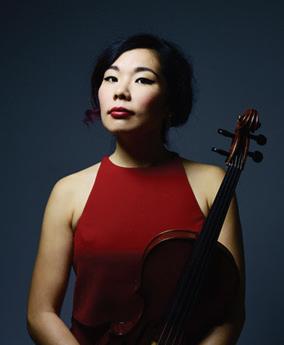
Hailed for her “magnetic, wide-ranging tone” and her “rock solid technique” (Philadelphia Inquirer), violist Ayane Kozasa is a sought-after chamber musician, collaborator, and educator. Since winning the 2011 Primrose International Viola Competition— where she also captured awards for best chamber music and commissioned work performances—Ayane has appeared on stages across the world, from Carnegie, Wigmore, and Suntory Hall to Ravinia, Aspen, and the Marlboro Music Festival. She is a passionate advocate for the expansion of viola repertoire, and has commissioned multiple new works featuring the viola, including “American Haiku” by Paul Wiancko and “K'Zohar Harakia” byJudd Greenstein. Ayane has developed a career that revolves around the art of chamber music. As a founding member of the Aizuri Quartet for 11 years, she developed
her skills of launching a brand new ensemble. The quartet was the 2018 quartet-in-residence at the Metropolitan Museum and the grand prize winners of both the Osaka International String Quartet Competition and MPrize Chamber Arts Competition. Their dedication to the art of the string quartet for 11 years was recognized by Chamber Music America, and in 2022 the quartet received the Cleveland Quartet Award.
She is currently a member of the duo Ayane & Paul with composer and cellist Paul Wiancko, with whom she collaborated on Norah Jones’ album Pick Me Up Off the Floor. The duo has appeared at several festivals, including Spoleto Festival USA, Brooklyn Chamber Music Society, and the St. Lawrence String Quartet Seminar. Beginning in the fall of 2024, Ayane joined the Kronos Quartet as their new violist.
by Shervin Lainez.
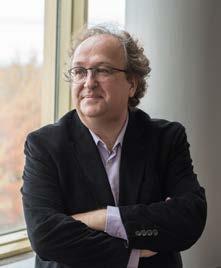
Guillaume Sutre was only eighteen years old when he won the Alberto Curci International Violin Competition in Naples, Italy and the International Piano Trio ARD Competition in Munich. The list quickly fills out with a first prize at the European Chamber Music Competition FNAPEC (1989), first prize at the Fischoff Chamber Music Competition (USA 1990), first prize at the Lily Laskine Competition (1991) and winner of the Prix Georges Enesco de la SACEM (1994). In 1999, he was named Chevalier of the Order of Arts and Letters by the French government.
Mr. Sutre was attracted to chamber music early in his career. In 1986, he founded the Trio Wanderer; ten years later he became the first violinist of the Ysaÿe Quartet, a post he held for almost twenty years until their farewell concert in 2014 in Paris’ Cité de la Musique. With his wife Kyunghee Kim-Sutre, they form a violin and harp duo and
continue to explore and enrich the existing repertoire for this group, conducting extensive research in music libraries around the world while commissioning works from young composers.
Before joining the Faculty of Music of the University of Montreal in 2021, he was professor of a string quartet class at the Conservatoire à Rayonnement Régional de Paris, professor of violin and director of chamber music for strings at the UCLA Herb Alpert School of Music in Los Angeles.
Mr. Sutre is passionately committed to imparting his knowledge upon musicians of younger generations. He regularly serves on juries of prestigious competitions, such as the Long-Thibaud International Violin Competition and the International String Quartet Competition in Bordeaux.
Photo by Amelie Philiberte.
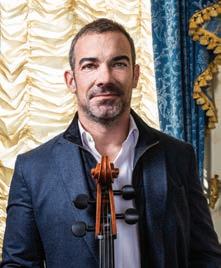
Cellist Joshua Gindele, a founding member of the Miró Quartet, began his cello studies at the age of three, playing a viola his teacher had fitted with an endpin. As cellist for the Miró, Josh has taken first prizes at several national and international competitions including the Banff International String Quartet Competition and the Naumburg Chamber Music Competition. In 2005, the Miró Quartet became the first ensemble ever to be awarded the coveted Avery Fisher Career Grant. He has shared the stage with some of the classical world’s most renowned artists including Yo-Yo Ma, The New York Philharmonic, Pinchas Zuckerman, Joshua Bell, Midori, Andre Watts and Menahem Pressler. He continues to perform across four continents and on some of the world's most prestigious concert stages.
Gindele
In 2006 Joshua co‐founded www.classicallounge.com. This is an online networking site where you can meet musicians, both professional and amateur, discover new talent or get discovered, share music, post and get concert information, share opinions, post classified ads and much more. The site was sold to www.classicalconnection.com in August 2009.
Deeply committed to music education, the Miró has been the Faculty String Quartet-in-Residence at the Sarah and Ernest Butler School of Music at the University of Texas at Austin since 2003 and he maintains an active studio of cellists as a professor there.
An active gym rat and tennis player, Josh and his wife, Rebecca Gindele, have a son and daughter, George and Nora.
Photo by Jeff Wilson.
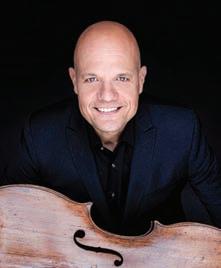
Eckart Runge
As a founding member of the internationally acclaimed Artemis Quartet, Eckart Runge marked the characteristic profile of the group over the course of three decades. In 2019, he decided to look for new artistic challenges.
He was appointed Artist in Residence at the prestigious concert series ‘Glocke Bremen’ (2021–24), BASF Ludwigshafen (2022–23), and Carinthischer Sommer (2024).
His first solo album was released in 2020 with the Berlin Radio Symphony Orchestra (RSB), featuring the world premiere recording of Nikolai Kapustin’s jazzy Cello Concerto Op. 85 This recording was awarded the prestigious Prize of the German Record Critics.
For 26 years, his Duo Runge&Ammon has performed at international festivals, series and clubs. In 2021, the duo released the album Revolutionary Icons (Berlin Classics), exploring Beethoven in the reflection of iconic rock-pop-jazz artists like Jimi Hendrix,
Frank Zappa, and Miles Davis. Their juxtaposition of baroque and jazz music on their album Baroque in Blue (2023) was hailed by the press. In 2025, the duo will release Opium, an album reflecting on freedom and creativity between the two world wars, but also its shadow of catastrophe, and its referral to our present decade.
Eckart Runge studied with David Geringas in Lübeck and the Alban Berg Quartet in Vienna. Further artistic inspirations include Lynn Harrell, Alfred Brendel, Walter Levin and György Kurtag. Several awards in international competitions in Cremona, Geneva and Munich launched his performing career to a world stage.
Eckart Runge has held professorships at the University of Arts in Berlin and the Chapelle de la Reine Elisabeth in Brussels. In 2023 he was appointed professor for chamber music at the Robert Schumann Hochschule in Düsseldorf.
Photo by Nada Navaee.
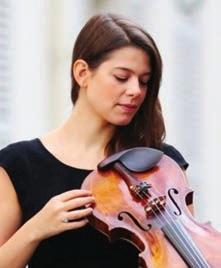
Marie Chilemme was born in Toulouse, France and began playing the viola at the age of three. In 2005 she was admitted to the CNSM of Paris, to study with Jean Sulem. Each year from 2008 to 2013 she was selected for The Academy Ozawa in Switzerland (IMAS), where she received coaching from Paméla Franck, Robert Mann, Sadao Arada, Nobuko Imai, and Seiji Ozawa. In 2010, she obtained her Master’s degree from the CNSM of Paris. Next, Marie attended the Hochschule Hanns Eisler of Berlin in Tabea Zimmermann class as well as being admitted to String Quartet’s Class of the Artemis Quartet. In 2012, Marie and her brother formed Quatuor Cavatine, winning prizes at two prestigious competitions, the
International Competition of Chamber music of Hamburg and the second Prize at the Banff International String Quartet Competition in Canada. Marie was then admitted to the Queen Elisabeth Music Chapel in Brussels as a resident in the Viola Class of Miguel Da Silva. In October 2017, she joined the Quatuor Ébène.
In January 2021, the quartet was commissioned by the University of Music and Performing Arts in Munich to establish a string quartet class as part of the newly founded Quatuor Ébène Academy.
Marie plays on ‘the Gibson’ 1734 Stradivari, an exceptionally generous loan from the Stradivari Foundation Habisreutinger.
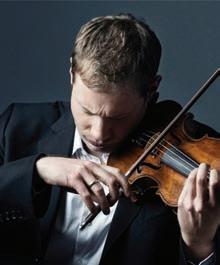
One of Canada’s brightest talents, violinist Jonathan Crow exudes “masterful coolness” (The Montreal Gazette) as concertmaster of the Toronto Symphony Orchestra. A native of Prince George, British Columbia, Jonathan earned his Bachelor of Music in Honours Performance from McGill University in 1998, at which time he joined the Montreal Symphony Orchestra as Associate Principal Second Violin. Between 2002 and 2006, Jonathan was the Concertmaster of the Montreal Symphony Orchestra, becoming the youngest concertmaster of a major North American orchestra. Jonathan continues to perform as guest concertmaster with orchestras around the world, including the National Arts Centre Orchestra, Pittsburgh Symphony Orchestra, Mahler Chamber Orchestra, Filarmonia de Lanaudière and Pernambuco Festival Orchestra (Brazil).
Jonathan has performed as a soloist with most major Canadian orchestras including the Montreal, Toronto, and Vancouver Symphony Orchestras, the National Arts Centre and Calgary Philharmonic Orchestras, the Victoria and Kingston Symphonies, and Orchestra London, under the baton of such conductors as Charles Dutoit, Sir Yehudi Menuhin, Sir Andrew Davis, Peter Oundjian, Gustavo Gimeno, Kent Nagano, Mario Bernardi, and João Carlos Martins.
An avid chamber musician, Jonathan has performed at many chamber music festivals in Europe and North America, and is the Artistic Director of Toronto Summer Music. He is a founding member of the JUNO Award-winning New Orford String Quartet, a new project-based ensemble dedicated to the promotion of standard and Canadian string quartet repertoire. Jonathan is currently Associate Professor of Violin at the University of Toronto.
Photo by Chris Wahl.
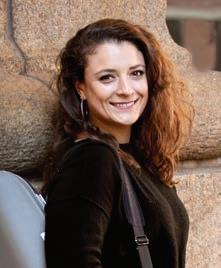
Praised by Strad magazine as having “lyricism that stood out...a silky tone and beautiful, supple lines,” Milena Pajaro-van de Stadt has established herself as one of the most sought-after violists of her generation. In addition to appearances as soloist with the New York String Orchestra at Carnegie Hall, the Tokyo Philharmonic, the Jacksonville Symphony, the Sphinx Chamber Orchestra, and Symphony in C, she has performed in recitals and chamber music concerts throughout the United States, Latin America, Europe, and Asia, including an acclaimed 2011 debut recital at London’s Wigmore Hall, which was described in Strad as being “fleet and energetic...powerful and focused.”
Ms. Pajaro-van de Stadt was the founding violist of the twice Grammy-nominated Dover Quartet, and played in the group from 2008–2022. During her time in the group, the Dover Quartet was the first prize winner and recipient of every special
award at the Banff International String Quartet Competition 2013, and winner of the Gold Medal and Grand Prize in the 2010 Fischoff Chamber Music Competition. Also during her tenure, the Dover Quartet received the Cleveland Quartet Award and an Avery Fisher Career Grant. Her numerous awards also include first prize at the Lionel Tertis International Viola Competition and top prizes at the Sphinx Competition and the Tokyo International Viola Competition. While in the Dover Quartet, Ms. Pajaro-van de Stadt was on the faculty at The Curtis Institute of Music and Northwestern University’s Bienen School of Music, and a part of the Quartet in Residence of the Kennedy Center in Washington, D.C. She is now a member of the newly formed piano quartet “Espressivo!” along with acclaimed artists Jaime Laredo, Sharon Robinson, and Anna Polonsky.
Photo by Eva Ravel.
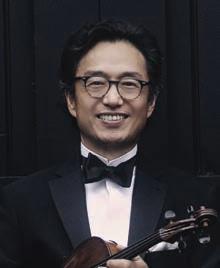
Honggang Li is the founding member of the Shanghai Quartet, now in its 41st seasons, and has performed over 2,500 concerts in 30 countries and can be heard on more than 35 CD albums. Li began studying the violin with his parents at age seven. When the Central Conservatory of music in Beijing reopened in 1977, Li was selected to attend from a group of over five hundred applicants. He continued his training at the Shanghai Conservatory and co-founded the Shanghai Quartet with his brother Weigang while in his senior year in the conservatory. The quartet soon became the first Chinese quartet to win a major international chamber music competition (1985 Portsmouth International String Quartet Competition) and came to the U.S. in 1985. He served as a teaching
assistant to the Juilliard Quartet at Juilliard School in New York in 1987, the same year he won the special prize (a 1757 DeCable violin) given by Elisa Pegreffi of Quartetto Italiano at the First Paolo Borciani International Competition in Italy.
From 1989 to 2021, Li was Artist-inResidence at Montclair State University and University of Richmond. He has been the viola professor at Bard Conservatory and guest professor of both conservatories of Shanghai and Beijing. Li is also the guest principal violist of the Shanghai Symphony Orchestra since 2009. In addition, he joined The Tianjin Juilliard School as resident faculty in the fall of 2020.
Photo by Sophie Zhai.

Violinist Eugene Drucker, a founding member of the multiple Grammy Award-winning Emerson String Quartet, is also a soloist. He has appeared with the orchestras of Montreal, Brussels, Antwerp, Liège, Hartford, Richmond, Louisville, and Jerusalem, as well as with the American Symphony Orchestra, the Aspen Chamber Symphony and the Las Vegas Philharmonic. A graduate of Columbia University and the Juilliard School, where he studied with Oscar Shumsky, Mr. Drucker was concertmaster of the Juilliard Orchestra, with which he appeared as soloist several times. He made his New York debut as a Concert Artists Guild winner in the fall of 1976, after having won prizes at the Montreal Competition and the Queen Elisabeth Competition in Brussels. Mr. Drucker has recorded the complete unaccompanied works of Bach, reissued by Parnassus Records, and the complete sonatas and duos of Bartók for Biddulph Recordings.
His first novel, The Savior, was published by Simon & Schuster in 2007 and later
appeared in a German translation called Wintersonate. A second novel, Yearning, was published in 2021.
Mr. Drucker's suite for string quartet, Series of Twelve, was commissioned by the New Music for Strings Festival in Denmark. It was premiered in Copenhagen and Reykjavik in August 2018 and was later performed by the Escher Quartet in the U.S. He has also composed several settings of poetry by Shakespeare and Denise Levertov for voice and strings.
Eugene Drucker has taught at Stony Brook University since 2002, and recently joined the faculty of the Manhattan School of Music. He became Music Director of the Berkshire Bach Society’s Bach at New Year’s Concerts in 2017, and was appointed year-round Artistic Director for that organization in 2024. He lives in New York City with his wife, cellist Roberta Cooper.
by Lisa-Marie Mazzucco.
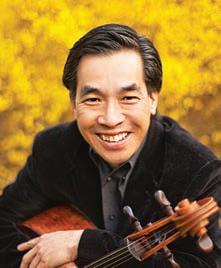
David Ying is cellist of the Grammy award-winning Ying Quartet. With the group he has performed widely throughout North America, and abroad, in traditional venues from Carnegie Hall to the Sydney Opera House. In addition, the quartet’s interest in making music a part of everyday life has led to performances in schools, hospitals, restaurants, correctional facilities, and the White House. From its earliest years in a National Endowment for the Arts residency in Jesup, Iowa, the quartet has explored every opportunity to share music, and sought to communicate music’s expression of shared humanity.
The quartet also shares music through its recording activities. The Ying Quartet’s recording projects range from standard string quartet repertoire to its Lifemusic commissions to unusual collaborations with distinguished artists. Its recording of the Tchaikovsky Quartets is among its four Grammy nominations, and a collaboration with the Turtle Island Quartet won a Grammy.
Apart from the Ying Quartet, David was a prizewinner in both the Naumburg International Cello competition and the Washington International Competition. In addition to performances with orchestra, he has played numerous recitals with pianist Elinor Freer, also his wife. Besides concertizing together, for ten years they also were artistic directors of the Skaneateles Festival. David is presently co-artistic director of the Bowdoin International Music Festival.
As a faculty member at the Eastman School of Music, David enjoys working with cellists and chamber music groups. His students and former students include members of orchestras such as the New York Philharmonic and the Utah Symphony, teachers, string quartet players, lawyers, and the cellist Alisa Weilerstein. David resides in Rochester, New York, with Elinor and their children Alina and Nathaniel.
Photo by Kate Lemmon.

Commissioned to write the Canadian Contemporary Composition for BISQC 2025, Kati Agócs is a multi-award-winning composer of triple citizenship (Canadian, U.S., and Hungarian) whose music is honoured and performed by leading musicians worldwide. Twice nominated for Classical Composition of the Year in the JUNO Awards, she has been described as “a composer of imposing artistic gifts” (Gramophone Magazine) who writes “sublime music of fluidity and austere beauty” (The Boston Globe). Kati’s music gives new expression to both folk melodies and sacred rituals—and distills diverse traditions into her own unique voice that “demands to be heard” (The New York Times). A Guggenheim Fellow and recipient of the lifetime achievement award in music composition from The American Academy of Arts and Letters, her music has been commissioned and performed by many premier ensembles and organizations including the Boston Symphony Chamber Players, Vancouver Symphony Orchestra, Minnesota Orchestra, Toronto Symphony Orchestra, New York Philharmonic, Ensemble
Reconsil Vienna, Lontano, National Youth Orchestra of Canada, Claremont Trio, Jupiter String Quartet, Continuum, Da Capo Chamber Players, Ensemble Contemporain de Montreal, Emmanuel Music, and the multiple Grammyaward winning ensemble Eighth Blackbird, who toured the U.S. with Immutable Dreams She was recently featured on Miller Theatre’s Composer Portrait Series at Columbia University in New York. About her cantata Voices of the Immaculate, premiered on her portrait concert by Lucy Dhegrae and Third Sound, The New York Times said: “For once, singing of complete and utter clarity… a simmering new cantata, conceived with transparency as a first principle… entirely, word for word, lucid.” Born in Windsor, Ontario of Hungarian and American parents, Kati studied composition at the Juilliard School with Milton Babbitt and voice privately with Adele Addison. She serves on the composition faculty at the New England Conservatory in Boston, and maintains a permanent work studio in Flatrock, Newfoundland.
Photo by Kate Lemmon.

Mark Steinberg is a founding member of the Brentano Quartet since its inception in 1992. The quartet is ensemble in residence at Yale University, has performed around the world, recorded extensively, and has won many awards, such as the Naumburg Chamber Music Award, the inaugural Cleveland Quartet award and the Royal Philharmonic Society award for best debut in the UK.
Along with his passion for chamber music, Steinberg has been soloist with the London Philharmonia, the Los Angeles Philharmonic, the Kansas City Camerata, the Auckland Philharmonia, and the Chamber Orchestra of Philadelphia, with conductors such as Kurt Sanderling, Esa-Pekka Salonen, and Miguel Harth-Bedoya. He has also toured in Europe and the U.S. as guest concertmaster of the Mahler Chamber Orchestra.
A sought after adjudicator, Steinberg has been on competition juries at the Banff International Quartet Competition, Wigmore Quartet
Competition, Mozart International Quartet Competition, Naumburg Violin Competition, and Chamber Music Competition, and will be on the jury for the 2027 Joseph Joachim violin competition. Steinberg has been and will be mentor-in-residence for the Banff International Quartet Competition, in 2022 and 2025.
Steinberg serves on the faculty of the Juilliard School and the CUNY Graduate Center, and is a faculty member of the Manhattan School of Music. He has taught often at Banff Centre for Arts and Creativity, the Aspen Festival, Norfolk Chamber Music Festival, the Steans Institute at Ravinia, and the Taos School of Music and has given master classes at Rice University, the Eastman School of Music, the Cleveland Institute of Music, New England Conservatory, the Glenn Gould School, the Amsterdam Conservatory, and numerous other schools.
Mentor-in-Residence Program supported in honour of the R.S. Williams & Sons Company.
Photo by Juergen Frank.
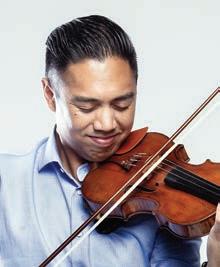
Adrian Anantawan Lecturer, violinist
Adrian Anantawan holds degrees from the Curtis Institute of Music, Yale University, and Harvard Graduate School of Education. As a violinist, he has studied with Itzhak Perlman and Pinchas Zukerman, and AnneSophie Mutter; his academic work in education was supervised by Howard Gardner. Memorable moments include performances at the White House, the Opening Ceremonies of the Athens and Vancouver Olympic Games, and the United Nations. Adrian helped to create the Virtual Chamber Music Initiative at the Holland Bloorview Kids Rehab Centre. The cross-collaborative project brings researchers, musicians, doctors, and educators together to develop adaptive musical instruments capable of being played by a young person with
disabilities within a chamber music setting. He is also the founder of the Music Inclusion Program, aimed at having children with disabilities learn instrumental music with their typical peers. Adrian is also JUNO Award nominee, a member of the Terry Fox Hall of Fame, and was awarded a Diamond Jubilee Medal from Her Majesty Queen Elizabeth II for his contributions to the Commonwealth. He is the current Chair of Music at Milton Academy, the Artistic Director of Shelter Music Boston, and is on faculty at Berklee College of Music. Throughout the year, Adrian continues to perform, speak and teach around the world as an advocate for disability and the arts.
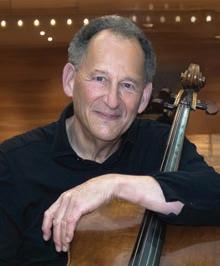
Denis Brott Lecturer, cellist
Founder and Artistic Director of the renowned Montreal Chamber Music Festival (1995), Professor of Cello & Chamber Music (1989), and Conductor of the Grand Orchestre à Cordes at the Conservatoire de musique du Québec à Montréal, Denis Brott is internationally recognized as one of Canada’s finest musicians. Denis Brott’s concert tours have taken him to four continents as a soloist, recitalist, and chamber musician. He was a cellist in the Orford String Quartet for almost a decade and recorded 25 discs, including Beethoven’s complete string quartets. These recordings won the Grand Prix du Disque Award and two JUNO Awards for Best Chamber Ensemble Classical Recording. He is the recipient of the Great Montrealer Award and the Queen Elizabeth Diamond Jubilee Medal in recognition of his cultural contributions to Canada. In 2014, Canada’s Governor General David Johnston bestowed
upon him the Order of Canada for his outstanding achievements, dedication to the community, and service to the nation. Denis has been a jury member for numerous distinguished international competitions, including the Munich Cello and String Quartet Competitions, the Banff and Evian International String Quartet Competitions, and most recently, the Montreal International Piano Competition Chamber Music Prize. As Executive Producer, Denis has curated more than 25 videos. In 2022, beginning with the CHUM hospital, he initiated a series of admission-free Health and Wellness Concerts for hospital patients, their families, and healthcare workers. In 2024, with the sponsorship of TD Bank, a two-year grant will ensure the continuity of this project, expanding it to include most major hospitals in Montreal and the surrounding area.
Photo by Luc Lauziere.
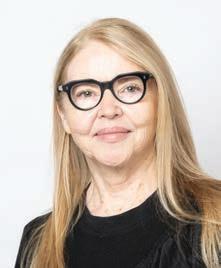
Theresa Leonard Audio Producer
Theresa Leonard is a highly soughtafter audio professional with extensive expertise in all aspects of music production, including audio postproduction and broadcast. Her impressive portfolio of work comprises hundreds of high-profile, award-winning, and nominated recording projects, with a diverse range of international artists such as the Gryphon Trio, The St. Lawrence String Quartet, The Dover String Quartet, Pacific Opera Victoria, Victoria Symphony, and The National Arts Centre Orchestra.
Theresa has received international recognition for her unwavering commitment to excellence in audio training and research, which she demonstrated during her tenure as Director of Audio at Banff Centre for Arts and Creativity. Through her leadership, she has provided unparalleled educational opportunities for multiple generations
of audio engineers, both through the Banff mentorship program and her presidency and fellowship with the Audio Engineering Society. As a result, she has been instrumental in shaping the careers of future leaders in the field, preparing them for major positions in the music technology and audio industries.
Theresaʼs expertise extends beyond production and engineering, as she continues to serve as a consultant, director, and/or faculty, with several international music festivals and academic institutions, including Royal Conservatoire of The Hague, Banff Centre for Arts and Creativity, and the Verbier Festival Academy. Theresa holds a Master of Music degree in sound recording from McGill University and bachelor’s degrees in both music and education.
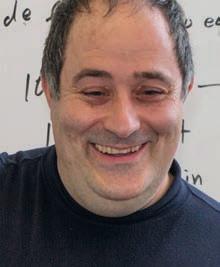
Moshe Renert
Official Mathematician
Dr. Moshe Renert is a well-known mathematics educator and a recognized authority on Mathematics Curriculum and Pedagogy. He is the co-founder of Renert School, a cutting-edge K-12 private school in Calgary, widely acknowledged as Canada’s preeminent mathematics school. In his spare time, Moshe is an avid music lover and an accordion player. Together with Dr. Ernst Enns, he has developed the innovative Optimal Jury Scoring System for fair judging of music competitions. The system is used by various competitions, including the Banff International String Quartet Competition and the Honens International Piano Competition.
Photo courtesy of Moses Renert.
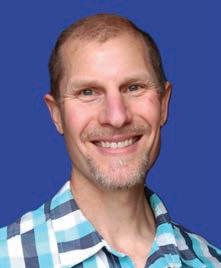
Dave Calgren
Official Mathematician
Dave is currently an instructor of math and engineering at the Southern Alberta Institute of Technology. He greatly enjoyed his last experience at BISQC in 2022 as an assistant mathematician and looks forward to being somewhat instrumental (pun intended) again in 2025.
Photo courtesy of Dave Calgren.
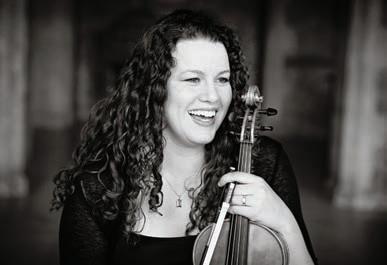
Artistic Advisor, Youth Chamber Music Program
Canadian violist Ronelle Schaufele is an active solo, chamber, and orchestral musician who performs frequently throughout Western Canada as well as performances in Cuba, Brazil, United States, New Zealand, and Europe. A proponent of new music, Ms. Schaufele has been delighted to play works composed for her over the years and looks forward to future collaborations. In addition to performing music of our time, Ronelle greatly enjoys performing on period instruments and is a founding member of Rosa Barocca, an ensemble that in collaboration with Elinor Frey, received the 2023 JUNO Award for Classical Album of the Year. Ronelle is currently assistant principal violist in the Red Deer Symphony Orchestra. Her education includes a Music Performance Diploma from Mount Royal College with William van der Sloot, a Bachelor of Music with distinction
from the University of Calgary, with Nicholas Pulos and an Artist Diploma at The Glenn Gould School studying with Steven Dann. Ronelle also completed an Artist in Residency program at Banff Centre for Arts and Creativity which remains a very special place for her, like so many other musicians who have been positively impacted by their time in this extraordinary institution. An active instructor, Ronelle is currently on faculty at the Amici String Program and in 2012 Ms. Schaufele founded the Banff String Academy of Music. Ronelle is delighted to once again be the Artistic Advisor for the Youth Chamber Music Program with the Banff International String Quartet Competition.
Ronelle loves living here in Banff with her husband Nigel, children Theodore and Frederica and dog Molly!
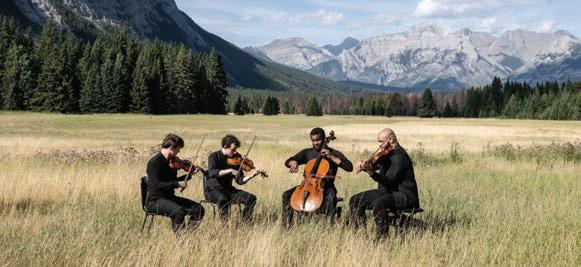
Adrian Steele & Phoenix Avalon, violin; Devin Moore, viola; Joshua McClendon, cello
Winners of a 2023 Avery Fisher Career Grant, and the 14th Banff International String Quartet Competition in 2022, the New York City-based Isidore String Quartet was formed in 2019 with a vision to revisit, rediscover, and reinvigorate the repertory. The quartet is heavily influenced by the Juilliard String Quartet and the idea of “approaching the established as if it were brand new, and the new as if it were firmly established.” The four began as an ensemble at the Juilliard School, and following a break during the global pandemic reconvened at the Kneisel Hall Chamber Music Festival in the summer of 2021 under the tutelage of Joel Krosnick. In addition to Mr. Krosnick, the ISQ has been coached by Joseph Lin, Astrid Schween, Laurie Smukler, Joseph Kalichstein, Roger Tapping, Misha Amory, Timothy Eddy, Donald Weilerstein,
Atar Arad, Miriam Fried, and Paul Biss. Outside the concert hall the quartet has worked with PROJECT: MUSIC HEALS US providing encouragement, education, and healing to marginalized communities— including elderly, disabled, rehabilitating incarcerated and homeless populations— who otherwise have limited access to high-quality live music performance. They have also been the resident ensemble for the Contemporary Alexander School/Alexander Alliance International where the ISQ explores the vast landscape of body awareness, mental preparation, and performance practice. The name Isidore acknowledges a shared affection for a certain libation— legend has it a Greek monk named Isidore concocted the first genuine vodka recipe for the Grand Duchy of Moscow!
by Rita Taylor.
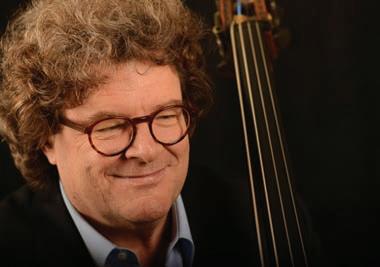
In December 2023, Joel was appointed a Member of the Order of Canada in recognition of his contribution to the musical life of the country and to the international scene. For over forty years, Joel Quarrington has been principal bass of numerous orchestras including the Canadian Opera Company, the Toronto Symphony Orchestra, the National Arts Center Orchestra of Canada, as well as the famous London Symphony Orchestra.
Born in Toronto, Joel began his double bass studies at the age of thirteen. At the end of these, he won the prize of the Radio-Canada Competition as well as the prestigious Geneva Competition.
A dedicated teacher, Joel teaches at the Montreal Conservatory of Music, and is appointed “Visiting Professor” teaching at the Royal Academy of Music in London. In addition to his activities as a guest teacher in numerous schools around the world, Joel gives master classes at Orford Musique.
Joel Quarrington has recorded numerous albums as a soloist, some of which have won JUNO and Opus Awards.
The International Society of Bassists awarded him special awards recognizing his outstanding performances as a soloist and orchestral musician.
Joel plays a bass by Italian master Santo Paolo Maggini dating from 1660.
Photo by Fred Cattroll.

Yoanna Haeun Jang is an 18-yearold Canadian violinist, studying with Barry Shiffman, and Neuroscience Specialist student in a joint program between the Glenn Gould School and the University of Toronto. A first prize winner at the Canadian Music Competition, she has performed with several orchestras in prestigious halls like Koerner Hall. Passionate about music and medicine, Yoanna regularly performs in hospitals and care homes, sharing her art as a form of healing and connection.
by Stuart Lowe.
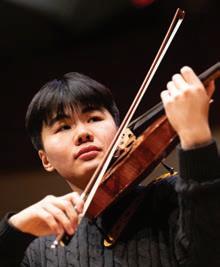
Violist Harrison Yang Meng, a full scholarship student at The Phil and Eli Taylor Performance Academy, began violin at seven and started viola at 14. A prize-winning soloist, he won Grand Prize at the 2024 International Music Festival Competition, the TSYO and NYCO concerto competitions, and will perform with both orchestras in 2025–26. He’ll also perform a full concerto with the Kindred Spirits Orchestra in the 2025–26 season. He has previously attended the Heifetz Institute and Caledon Music Festival. Harrison studies with Theresa Rudolph and serves as principal violist in multiple ensembles.
by Stuart Lowe.
Launched in 2010, the Youth Chamber Music Program creates a special, welcoming, and affirming experience for young musicians as part of the Banff International String Quartet Competition.
This year, we welcome the Bow River Quartet from the Amici String Program in Calgary, Alberta, the Peak Quintet from the Vancouver Academy of Music, and The Taylor Quintet from The Phil and Eli Taylor Performance Academy for Young Artists at the Royal Conservatory of Music in Toronto.
These promising young musicians will attend BISQC lectures and concerts, receive coaching from some of the leading musicians of our time, and will be heard in select performances in the community as part of BISQC’s outreach initiatives.
Further, these young musicians will perform around Banff Centre campus throughout BISQC week. We hope you will enjoy the opportunity to hear them and join in supporting them on this exciting artistic journey.
It is my privilege to serve as Artistic Advisor of this youth program for the fourth time. Each year I am inspired by the enthusiasm, joy, and love of chamber music these youth exude. I am confident this will be a transformative and exciting week for these emerging artists and am delighted that all of you are here in breathtaking Banff to experience it alongside us.
Sincerely,
Ronelle Schaufele Artistic Advisor, Youth Chamber Music Program, BISQC
Bow River Quartet
Maya Brideaux, violin
Megan Wang, violin
Hannele Agbunag, viola
Curtis Fok, cello
Peak Quintet
Hyden Ho, violin
Michiyo Yu, violin
Irene Lim, viola
Valery Lou, viola
Charles Lim, cello
The Taylor Quintet
Yoanna Haeun Jang, violin
Edward Wu, violin
Harrison Meng, viola
Emma Tian, cello Angelina Zhou, piano
The 2025 Youth Chamber Music Program is generously supported by the Eagles Nest BISQC Young Artists Endowment and Susan Larson.

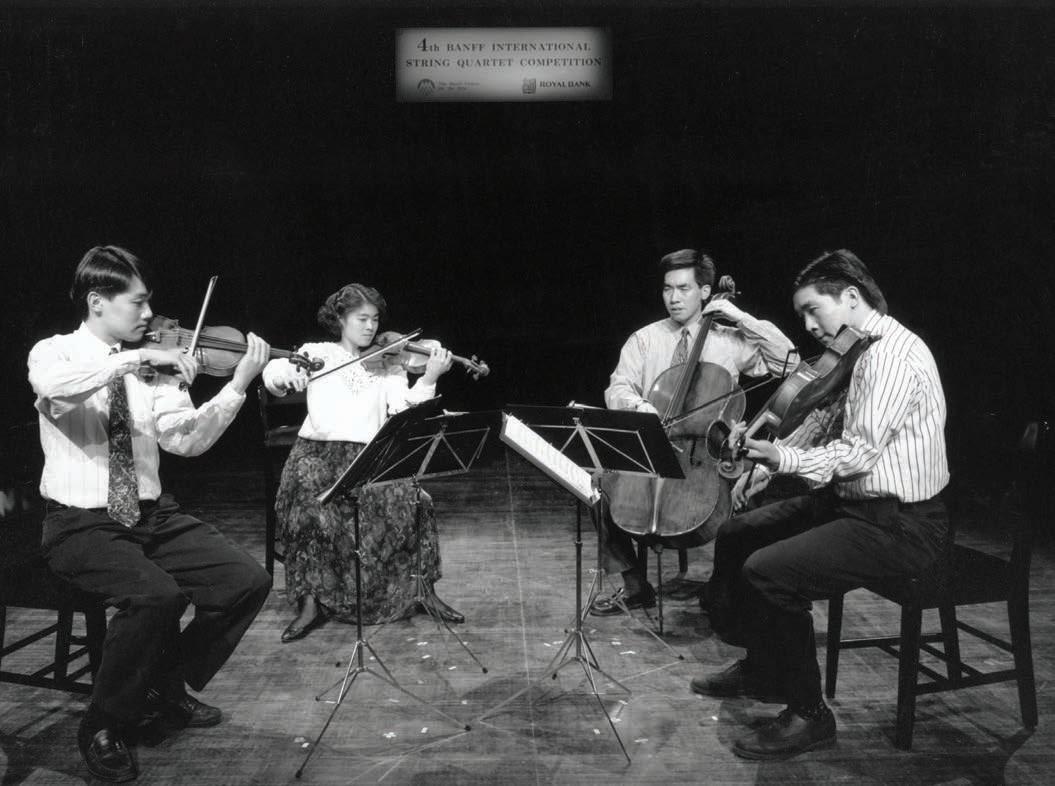
By Nazareth Araújo, Porter OʼBrien
The path of a musician is rarely linear. It is often filled with unexpected twists, challenging climbs, and moments of reflection. For the Miró and Ying Quartets, their experiences at BISQC marked pivotal moments in their careers, presenting both challenges and opportunities that shaped their trajectories. The Miró Quartet’s BISQC win in 1998 and the Ying Quartet’s second-place finish in 1992 not only brought them international recognition but also provided invaluable insights as they navigated the complexities of a long-term musical career. As the Miró Quartet celebrates 30 years of music-making in 2025 and the Ying Quartet continues its influential role in the classical music community, both ensembles embody the ongoing evolution of the string quartet— viewed not as a smooth, linear ascent, but as an adventure, filled with both challenges and growth.
When Joshua Gindele, cellist of the Miró Quartet, reflects on his time at BISQC, he recalls the experience not as a moment of triumph, but as an opportunity to deepen their connection as a group. “We made a vow to ourselves that we were going to have fun. The competition wasn’t about expectations or pressure, but about learning more about each other and building stronger interpersonal relationships.” The Miró Quartet’s victory certainly opened doors, but it also served as a chance to strengthen the young group’s bond and grow together as a cohesive ensemble.
Over the next 30 years, the group has weathered the inevitable challenges of the music world—balancing personal relationships, navigating the demands of the industry, and constantly pushing themselves to evolve as artists. The recent GRAMMY® nomination for their album Home in 2024 is a testament to their enduring relevance in the musical landscape yet Joshua explains that walking the red carpet as a nominee was not, as many might assume, the height of his career. “Thereʼs no peaks, thereʼs no valleys, itʼs the body of work that really makes a big difference.” To Joshua, “Music is a journey. There’s no final destination, just the work of constantly improving and finding new ways to connect with one another.”
For the Ying Quartet, their focus has always been on the artistic process rather than any singular moment of recognition. David Ying, cellist of the Ying Quartet, reflects on the group’s second-place finish at BISQC in 1992 as “only a small part of the larger picture.” With more than 30 years of experience, David shares that the longevity of the Ying Quartet comes from two fundamental pillars: a commitment to the music itself and to each member of the quartet. “This ability to collaborate successfully with other people and bring out the best in yourself—and then in the process bring out the best in other people too—should be celebrated at every stage of the game.”
“MUSIC IS A JOURNEY. THERE’S NO FINAL DESTINATION, JUST THE WORK OF CONSTANTLY IMPROVING AND FINDING NEW WAYS TO CONNECT WITH ONE ANOTHER.”
Both the Miró and Ying Quartets recognize BISQC as a pivotal moment in their early careers, highlighting the lasting connections and valuable insights they gained. For Joshua, the competition offered the Miró Quartet a chance to engage with other ensembles and build relationships that would shape their path. He recalls how the exposure to prominent judges and peers instilled confidence: “We didn’t feel like we were far off from other groups,” he notes. “It was about learning, getting better, and knowing that we had something unique to offer.”
– Joshua Gindele,
For the Ying Quartet, it was also about the camaraderie that came from being part of a community of likeminded musicians. David remembers his relationship with the St. Lawrence String Quartet, who went on to win first place at BISQC the same year. “We had a good relationship with them during and after BISQC,” he says. “We would often play before or after them at the competition. It was an amazing experience to see how other quartets approached the same material, and it gave us a deeper respect for the work of our colleagues.”
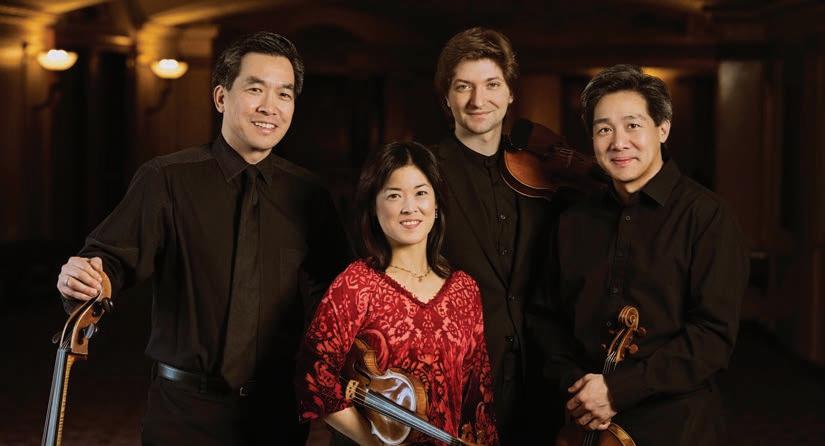
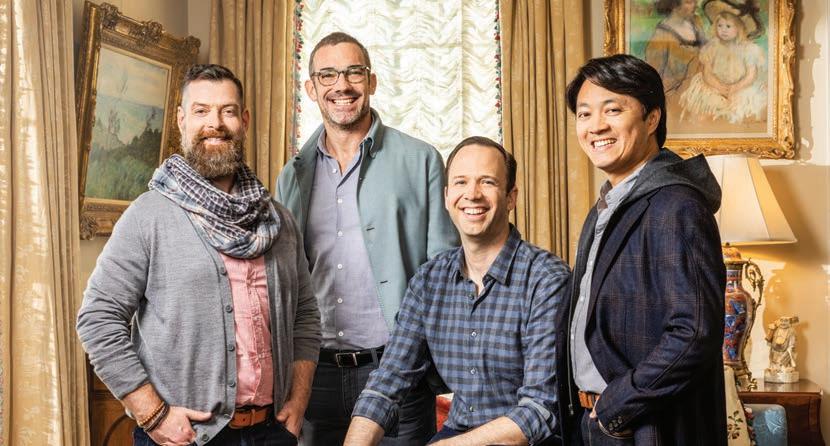

For both quartets, teaching other musicians has become a major part of their artistic process. They recognize that their legacy isn’t just about their recordings or performances, but about the impact they have on the next generation by guiding other young musicians as they evolve creatively. David, who currently serves on the BISQC 2025 competition jury and is an Associate Professor at the Eastman School of Music, notes that, “We’re part of a long tradition, and through our teaching, we help ensure that this tradition continues and evolves.”
Through their commitment to education, both the Miró and Ying Quartets ensure that the art of the string quartet, with its rich history and tradition, continues to thrive, influencing future generations of performers and composers.
“WE’RE PART OF A LONG TRADITION, AND THROUGH OUR TEACHING, WE HELP ENSURE THAT THIS TRADITION CONTINUES AND EVOLVES.”
thatʼs hundreds of years old and to be able to continue to do that… itʼs part of the legacy of the art that we all live in.” In addition to passing on technical knowledge, both quartets emphasize the importance of fostering a sense of connection between musicians, something they learned early on at BISQC. Their own educational experiences shaped how they teach, emphasizing collaboration and personal growth alongside artistic development.
– David Ying, Ying Quartet
Joshua, an Associate Professor at the Butler School of Music for 23 years, echoes this sentiment. “We’ve spent so many years with so many great teachers who passed down all this information
Ultimately, the Miró and Ying Quartets exemplify what it takes to sustain a string quartet in a constantly shifting musical landscape. Their success isn’t defined by a single competition win or GRAMMY® nomination, but by their ongoing commitment to growth and their ability to adapt over time. The path is rarely predictable, and certainty is never guaranteed. Yet both ensembles have demonstrated that dedication to their music, to one another, and to nurturing the next generation creates a powerful story of artistic evolution and enduring impact.

By Caitlin Dutt, Porter OʼBrien
Each year, the Banff International String Quartet Competition (BISQC) brings together up to ten quartets from around the world, along with youth and gala performers, to compete and celebrate the art of chamber music. While audience members see the musicians performing over the course of several days, it takes a village of people to organize and execute all aspects of the festival to make it what it is: from audio producing and media production to donor relations and cuisine, there are dozens of people essential to BISQC’s success.
Jennifer Knorr Manager, Stewardship, Research and Events
As Manager of Stewardship, Research and Events, Jennifer Knorr spends her summers hosting donors and potential supporters by showing them first-hand the impact of their generosity to Banff Centre. During the fall and winter, she focuses on supporting all fundraising activity including being a key member of the planning team for large on-site events, including BISQC and the annual signature fundraising event, Banff Centre Celebrates.
By establishing donor relationships and maintaining them, Knorr is a key bridge to making the competition run smoothly and successfully. Contributions from donors, sponsors, and supporters are critical to Banff Centre’s success.
“It takes a village to pull this off and donors are a huge component of that.”
Knorr was involved in theatre productions throughout school, and has always been drawn to the arts. While her career has taken a different path, she says supporting artists in their work is an incredible opportunity.
“The artistic community welcomes anyone whoʼs curious and I was one of those people.”
She said that the donors and supporters of Banff Centre and BISQC are similar to herself in that regard. They may have been artistic or musical in their youth or always wanted to be and are inspired by the artists and musicians who have made their way to Banff Centre.
“They are just as in awe of the musicians ’ ability to follow their dreams as I am.”
Theresa Leonard Audio Producer
Involved with BISQC since 1998, Theresa Leonard has dedicated much of the past quarter century to bringing music from BISQC to audiences at home and around the world.
BISQC now livestreams its competitions and creates audio recordings of the finalists during a residency at Banff Centre. As a music producer, and former director of audio at Banff Centre, Leonard works with the Banff Centre’s audio team for the recording and mixing of the live stream to ensure audiences at home get a sound they would hear from the stage.
Leonard said the recording residencies for the winners are a learning experience for the musicians, many of whom have never worked with an audio producer before. She said it’s an opportunity to “learn to listen to each other and to learn more about themselves as musicians because listening back to a recording is a great training ground.”
“Itʼs great for musicians in today ’ s world to be prepared because thereʼs so much live broadcast that they have to be comfortable recording and Banff Centre for Arts and Creativity provides a really safe place.”
Leonard says recording is a multiple day process and the result is a seamless recording of sound.
“It ’ s our job to capture the emotion of a live concert. So, we're going after I guess what you might call the goosebump factor.”
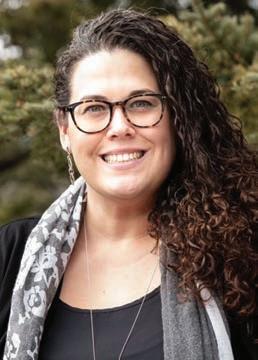
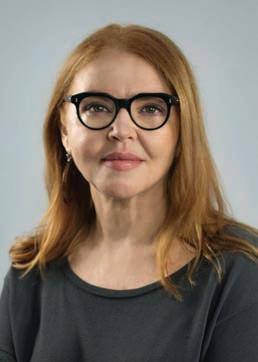
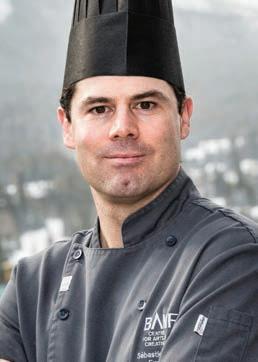
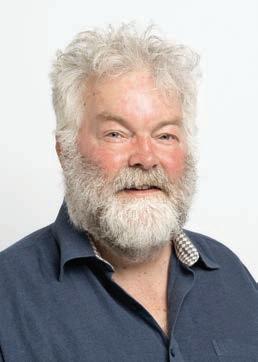
Sébastien Tessier Executive Chef
The music may be the reason why people attend the BISQC, but Sébastien Tessier and the culinary team alongside him are working hard to make it a holistic experience in one of the most beautiful places in Canada.
“We’re trying to make their stay here the most enjoyable possible and enhance what they ’ re really here for: to witness some great music.”
As executive chef, Tessier primarily focuses on designing menus and sourcing local ingredients. During BISQC, the culinary team and front of house, about 110 people, serve 4,500 to 5,000 people. At Banff Centre’s Vistas Dining Room, the lunch and dinner menus change every day.
People often rush in and out to catch the next performance, but there are moments when they stay, chat, and express their enjoyment of the meal to the team. Creating a memorable experience is possible, Tessier says, because of partnership.
“I rely on so many team members to execute our vision and contribute their ideas as well to create some dishes.”
As a not-for-profit organization, Banff Centre’s restaurant profits go back to supporting artists and its programming. Because of that purpose, it’s a special place to work, said Tessier.
“There ’ s strong support for wanting to be different and embrace excellence. We donʼt face pressure to do the impossible here. But if each and every team member, including myself, is trying to come to work and see what little things we can change today to make it a bit more special to our guests, I think we achieved something.”
Woody MacPhail
Video Producer and Camera Director
Video producer and camera director
Woody MacPhail says he and his team’s favourite part of capturing moments on stage is highlighting the details that someone sitting in the audience might not see: the silent communication between musicians, seeing their eyes and facial expressions so closely.
MacPhail co-ordinates the capture of live events and packages promotional media materials for distribution. The video recordings of concerts are streamed live to various social media outlets, while selections of the audio are typically broadcast post-event to CBC Radio and the European Broadcasting Union (EBU).
As well, quartets often use the concert recordings for training purposes, grant applicants, and career promotion.
“[These recordings] enable the global community to enjoy the fruits of the musicians’ performances and showcase Banff Centre efforts and associated sponsor support.”
When asked what makes BISQC special, he said it’s all about the musicians.
“Being able to showcase the efforts of world class talent to an avid enthusiastic live audience and also on the global stage at a high level of performance and presentation proficiency is a true joy. What's NOT special about it?”
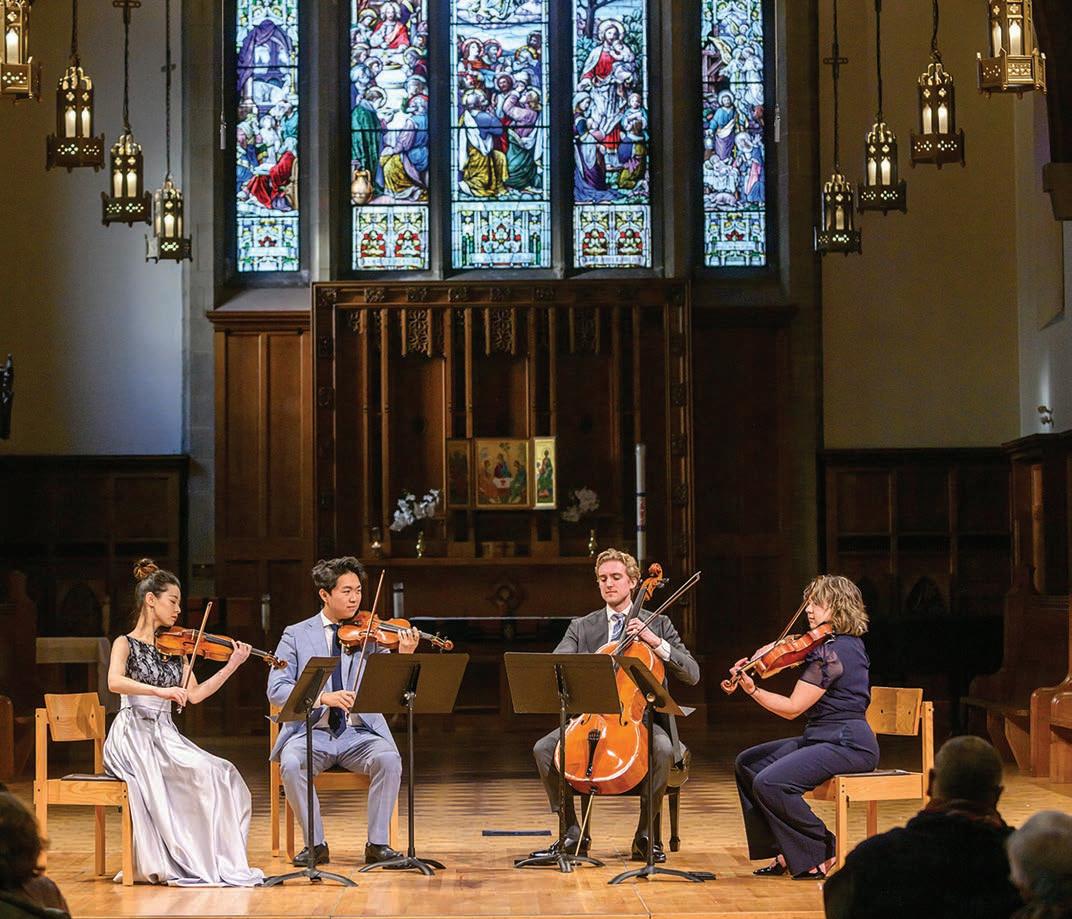
By Caitlin Dutt, Porter OʼBrien
This year’s Banff International String Quartet Competition sold out its general packages within minutes. More than 400 attendees will be in Banff to celebrate chamber music, and that’s not including the 73 competitors and other musicians.
Pat Zagelow is a longtime attendee of BISQC. As executive director of Friends of Chamber Music based in Portland, Oregon, she’s been leading a group of chamber music fans to the festival since 2007. This year, she said she’s seen a notable increase in sign-ups: from an average of 35 to 51.
“I think it is just so amazing to be in a space like [Banff Centre] where youʼre completely immersed in chamber music … [You’re] talking about it and listening to it and meeting other people from around the world, certainly around this continent, about their experiences.”
Pat remembers a moment listening to chamber music years ago that solidified her as a fan. She said she was listening to a piano quintet play Dvořák at the Santa Fe Chamber Music Festival.
“After hearing the first movement I couldn’t believe it could get any better and then each movement after that blew me away even more.”
James Campbell, the artistic director of the Festival of Sound in Parry Sound, ON, and a professor emeritus at the Jacobs School of Music at Indiana University, says “chamber music is often the last form of music that music lovers are drawn to in their lifetime.”
“It is a very centering experience for people. Itʼs a place to get away from the noise. The intimacy of a string quartet, music doesn’t get any more intimate than that.”
While the world went into lockdown in 2020 and took years to recover, James Ehnes, the artistic director of the Seattle Chamber Music Society, said it demonstrated how adaptable string quartets and chamber music can be.
“People were able to do a lot more, whether it was organizing smaller concerts or streaming or broadcasting things in other ways. I think that that was chamber music even by its very name, the idea of music being held in a room.”
By its nature, chamber music fosters a greater connection between artist and performer that people crave these days, Ehnes noted.
“100 years ago, a classical music performer was seen as someone up on a stage in their fancy clothes that you didnʼt really interact with,” continued Ehnes. “Putting musicians on pedestals and keeping this air of mystery around them was very cultivated in those days. Thatʼs not something we do so much nowadays. We want to know the people that weʼre listening to, and that applies across all aspects of entertainment.”
BY ITS NATURE, CHAMBER MUSIC FOSTERS A GREATER CONNECTION BETWEEN ARTIST AND PERFORMER THAT PEOPLE CRAVE THESE DAYS.
Campbell believes there will always be an audience for classical and chamber music.
“There will always be players, there will always be musicians, and the body of repertoire is amazing.”
He suggests chamber music festivals are growing because musicians are forming them to create a new opportunity in their communities. They find longterm success by sticking to the core value of presenting great music.
Campbell says there’s encouraging and discouraging signs for the future of chamber music. It’s discouraging to see chamber music festivals expanding to offer other music genres, which takes opportunities away for chamber music to be presented.
However, he said Gen Z and millennials are viewing chamber music as something worth exploring and the young classical musicians that Campbell has talked to give him a lot of hope.
“I walk away always feeling so optimistic that theyʼll figure out their world…and I feel my immediate goal with the Festival of Sound is to make sure they have a place to [perform].”

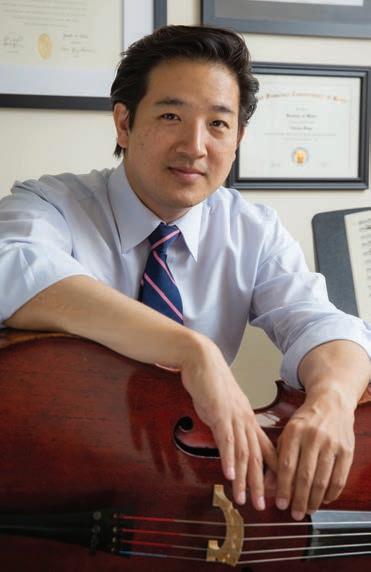
Adrian Fung, executive and artistic director of Vancouver’s Music in the Morning, has twice competed at BISQC with the Afiara Quartet and returned as a juror in 2019.
He explains that music competitions are a way to gain visibility and launch the careers of young musicians, but BISQC has done something special. As Music in the Morning’s subscription base has grown 34% annually, and BISQC continues to grow, he attributes both their success to the “how” and the mood they bring.
“[BISQC director Barry Shiffman] has created a festival dynamic, where everybody builds each other up, even though technically theyʼre competing … It really has this community feel. Everybody thinks that they're part of something larger than themselves.”
As chamber music evolves around them, Ehnes says he hopes BISQC will continue on the path itʼs on and keep doing what makes it have an “almost cult-like status.”
Ehnes continues, “What the team at BISQC manages to pull off time after time is creating this seamless Narnia-like magic fantasy land for chamber music lovers. Itʼs the most incredible atmosphere. Itʼs so uplifting. Itʼs so friendly and supportive. Itʼs really, really extraordinary.”

Banff Centre for Arts and Creativity applauds our media partners who bring stories and performances from BISQC 2025 to music enthusiasts across Canada and around the world.
Violin Channel
The world’s leading classical music news source. Now reaching in excess of a million string players internationally.
Complete live-streaming of the 2025 Banff International String Quartet Competition will be available on theviolinchannel.com

BISQC is proud to work with these public relations firms to further raise the profile of the competition and its remarkable competitors.

Banff Centre for Arts and Creativity
would like to thank the following $1,000+ generous supporters of BISQFest 2023, BISQFest 2024, and BISQC 2025: (at time of print)
Major Supporters
Christine and David Anderson
Anonymous
BISQC Endowments
Aurora Fund for the Advancement of String Quartet Music
Eagles Nest BISQC Young Artists Endowment
Freeze Family Career Development Program Fund, BISQC
R.S. Williams and Sons Company Ltd. Endowment Fund
Sylvia and Jack Chetner Scholarship Endowment
Lead Supporters
Ernie and Sandra Green
Christopher R. Head
Susan Larson
Official Luthier of BISQC 2025

Supporters
Ginger Anders and Joseph Baker
Gail Andrew
Graham and Maureen Carpenter
Estate of Jack Chetner
Norma and David Cooke
Alan Dornian
Alan and Valerie Fielding
Pamela Grigg Charitable Fund at Calgary Foundation
Mark and Nancy Heule
Lisa Higham and Alan Covington
Robert Hilsden
Ernest Howe
Connie Hunt and Ron Holdsworth
The JAGelber Fund
S.B. Joe
Hsing Jou
Edward and Ann Kerwin
Hong-Yol and Soo-Ok Kim
MacLachlan Ridge Family
Stephen and Lynn Murgatroyd
Sara Neely
Qiviuk Boutiques (Jacques Cartier Clothier Inc.)
Lore Ruschiensky and Dennis Weist
Tom and Ellen Smee
Anonymous
Support Banff Centre
To contribute to the continuous development of these young ensembles, please contact Jennifer Lamb, Director of Major Gifts, at 403.763.6005 or Jennifer_Lamb@banffcentre.ca.

CHANGE LIVES. INSPIRE CREATIVITY.

“BANFF CENTRE IS NOT JUST MUSIC, IT’S ARTS AND CREATIVITY AND SCIENCES AND ACTIVITY. YOU FEEL
LIKE YOU’RE IN THE EPICENTRE OF ALL THE THINGS THAT
BRING JOY TO HUMANS.”
– Isidore String Quartet, 1st Place Laureates BISQC 2022
Donate Today. banffcentre.ca/support-us
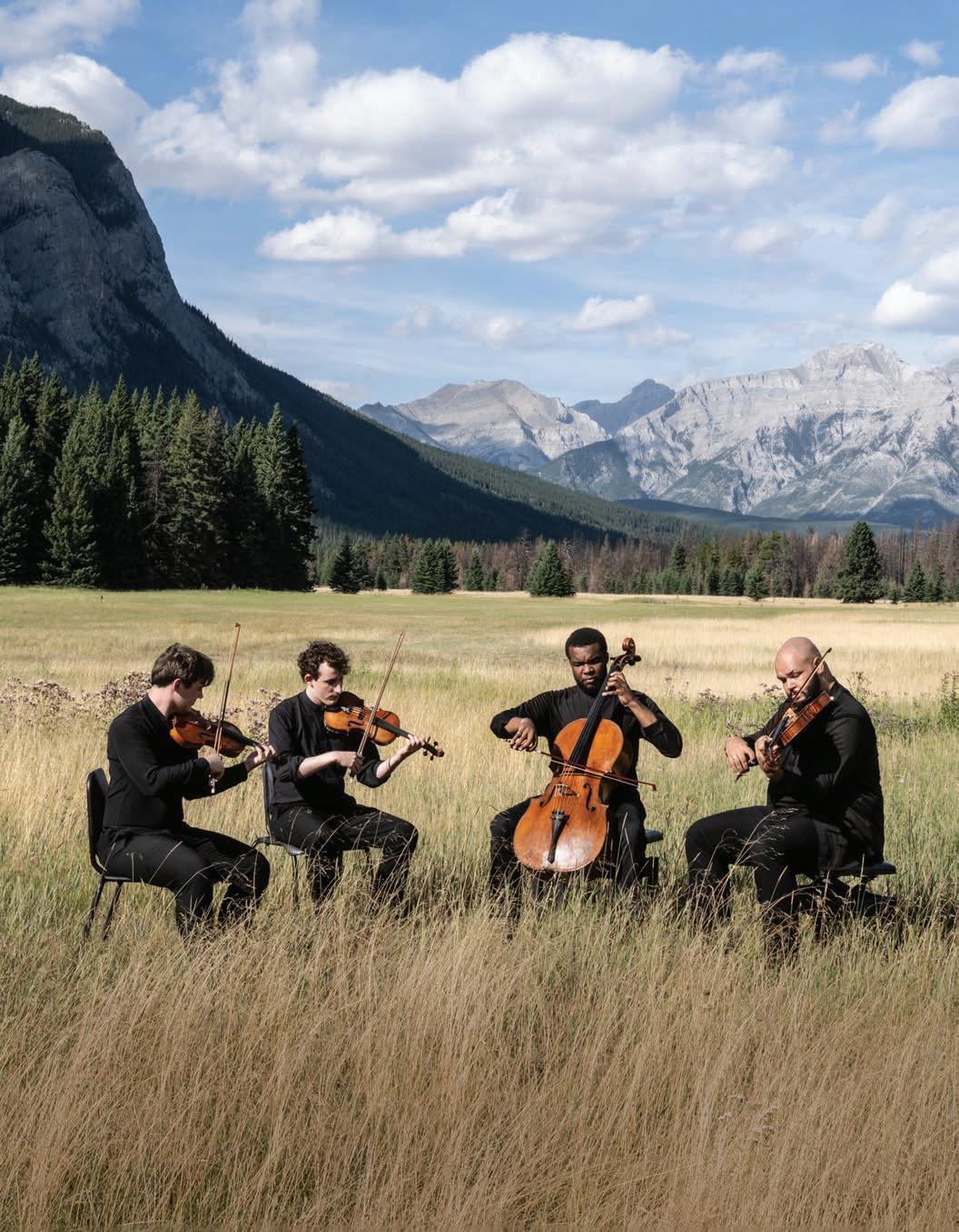
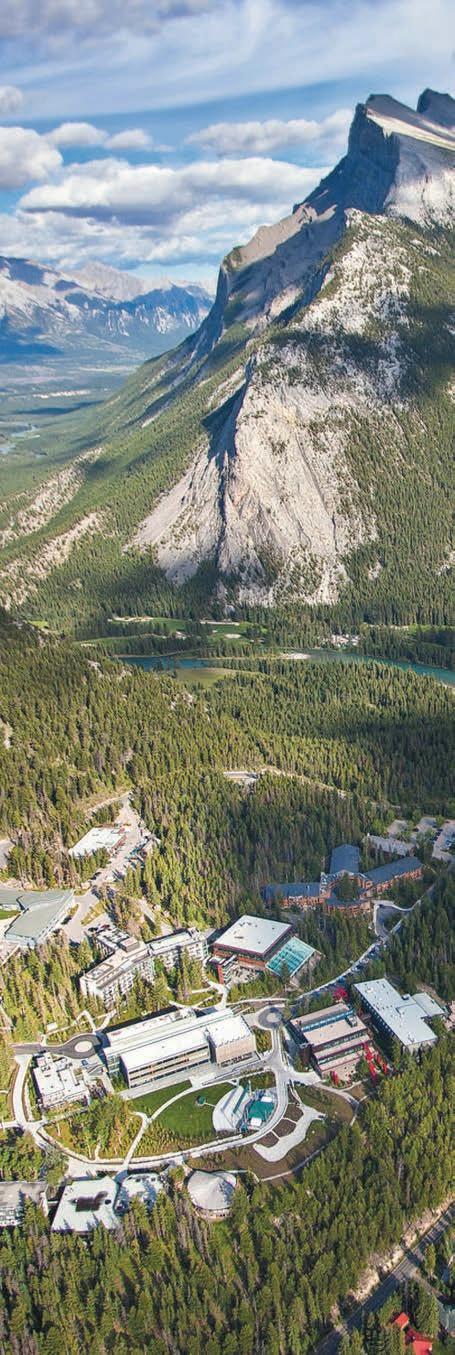
Mission Statement
Banff Centre exists to inspire artists and leaders to make their unique contribution to society. We aspire to be the global leader in arts, culture, and creativity. Human potential is realized at Banff Centre. As a unique creative and learning institution, we curate innovative programs that develop artists and leaders, inspiring them to conceive and create powerful works and ideas that are shared with the world. Banff Centre is a catalyst for knowledge and creativity through the power of our unique environment and facilities in the Canadian Rocky Mountains, our rich learning opportunities, cross-disciplinary and cross sectoral interactions, outreach activities, and performances for the public.
Banff Centre is supported by funding from the Government of Alberta through Alberta Enterprise and Advanced Education, Alberta Infrastructure, and the Alberta Foundation for the Arts. Arts programs are supported by funding from the Government of Canada through the Canada Council for the Arts, and the Department of Canadian Heritage through the Canada Arts Training Fund. The Banff Centre experience is also enriched through generous support from individuals, corporations, and foundations.
Photo by Paul Zizka.
Banff Centre Leadership Group
Chris Lorway, President and CEO
Kyla Conner, General Counsel and External Relations
Derek Fast, Executive Director, Marketing and Communications
Kurt Fonseca, Vice President, Hospitality, Conferences, and Physical Facilities
Valerie Kapay, Vice President, Talent Management and Culture
Aliza LeBlanc, Chief Financial Officer
Josephine Ridge, Executive Director, Arts
Mark Wold, Executive Director, Leadership
BISQC Leadership Team
Barry Shiffman, BISQC Director
Kameko Higa, Managing Director, Program Operations — Arts
For the complete list of all Banff Centre staff who have contributed to BISQC in the administration, marketing, production, and audience services departments, please visit: banffcentre.ca/bisqc/credits
Banff Centre Board of Governors
Paul Baay (Chair) – Calgary, AB
Brinna Brinkerhoff – Calgary, AB
Ron Hallman – Gatineau, QC
Françoise E. Lyon – Sainte-Julie, QC
Lori Paine – Calgary, AB
Pinder Sandhu – Calgary, AB
Naomi Schmold – Edmonton, AB
Santee Smith – Six Nations, ON
Myron Tétreault – Canmore, AB
Foundation Board
Leslie Belzberg – Los Angeles, USA
Susan P. Kololian – Toronto, ON
Sandy Martin – Calgary, AB
Mike McMillan – Toronto, ON
Aly Khan Musani – Calgary, AB
Paul Baay, Chair of Banff Centre Board of Governors (ex officio) – Calgary, AB
Chris Lorway, President & CEO, Banff Centre for Arts and Creativity (ex officio) – Banff, AB
We want to thank everyone at Banff Centre for Arts and Creativity who has supported the 15th Banff International String Quartet Competition—from feeding our audience and quartets, to booking tickets, creating awareness, fundraising, and ensuring the highest quality experience for all who attend and participate. We couldn’t do it without you!
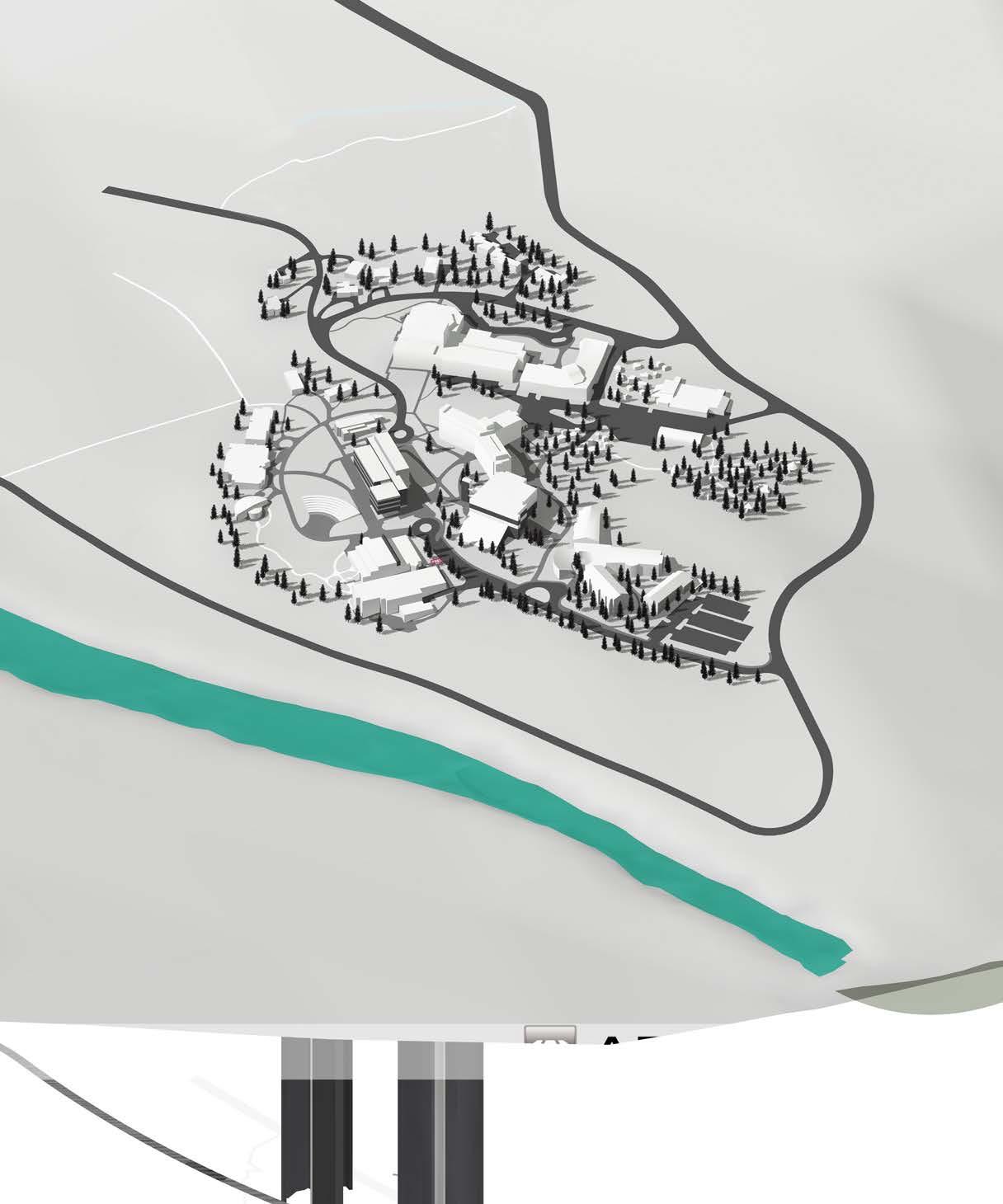
Maclab Bistro
For hours of operation, please visit banffcentre.ca/maclab-bistro.
Vistas
Breakfast 7:00 – 9:30 a.m.
Lunch 11:30 a.m. – 1:30 p.m.
Dinner Monday to Wednesday 5:30 – 7:30 p.m.
Thursday to Sunday 5:00 – 7:30 p.m.
1 Corbett Hall
2 Donald Cameron Centre Administration Offices
3 Îethka Mâkochî Ahogi Chi Pa Bi Ti: Îethka Territory House of Respect
4 G lyde Hall Walter Phillips Gallery
5 Ken Madsen Path to Banff Townsite
6 K innear Centre for Creativity & Innovation M aclab Bistro
Meeting Rooms & Banquets
Paul D. Fleck Library & Archives
7 Leighton Artist Studios
8 Lloyd Hall
9 Jeanne & Peter Lougheed Building
10 M ax Bell Building
11 M usic Building
Bentley Chamber Music Studio
Rolston Recital Hall
12 Music Huts
13 Physical Facilities Building Print Shop
Shipping & Receiving
Banff Centre Box Office
During BISQC, the Box Office will also be open 30 minutes prior to all performances.
Walter Phillips Gallery
Wednesday to Sunday 12:30 – 5:00 p.m.
14 Professional Development Centre H otel Reception
15 S ally Borden Building F itness & Recreation Centre
Participant Resources
Three Ravens Restaurant V istas Dining Room
16 Sh aw Amphitheatre
17 Theatre Complex
Box Office
CLVB ’33
Jenny Belzberg Theatre
Laszlo Funtek Teaching Wing
Margaret Greenham Theatre
18 TransCanada PipeLines Pavilion
Banff International Research Station
19 V inci Hall
21 Staff Housing
22 Staff Housing
Becker Hall
“… make music more intensely, more beautifully and more devotedly than ever before.”
— Leonard Bernstein

Our thanks go out to the 2025 BISQC competitors for their devotion to making our world more beautiful.









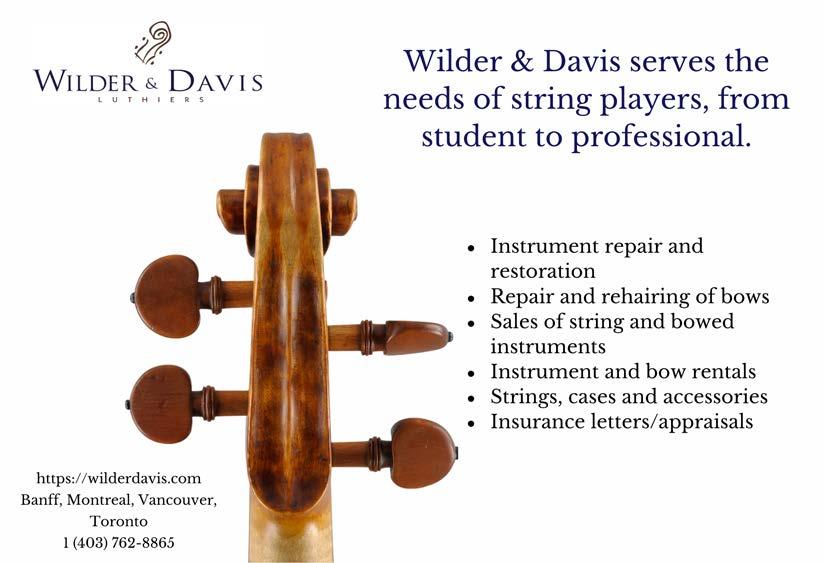
Season Subscriptions available online now
Individual Concert Tickets available online September 1
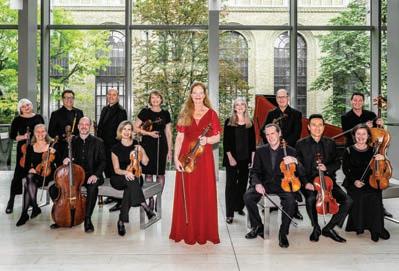
MASTERS SERIES
Pacifica Quartet & Cantaré Children's Choir
Tafelmusik
Baroque Orchestra
Busch Trio
Mandelring Quartet
Manhattan Chamber Players
HORIZON SERIES
Dreamers' Circus
Young Concert Artists On Tour
Formosa Quartet
banffcentre.ca/bisqfest


discover the Complete Artist


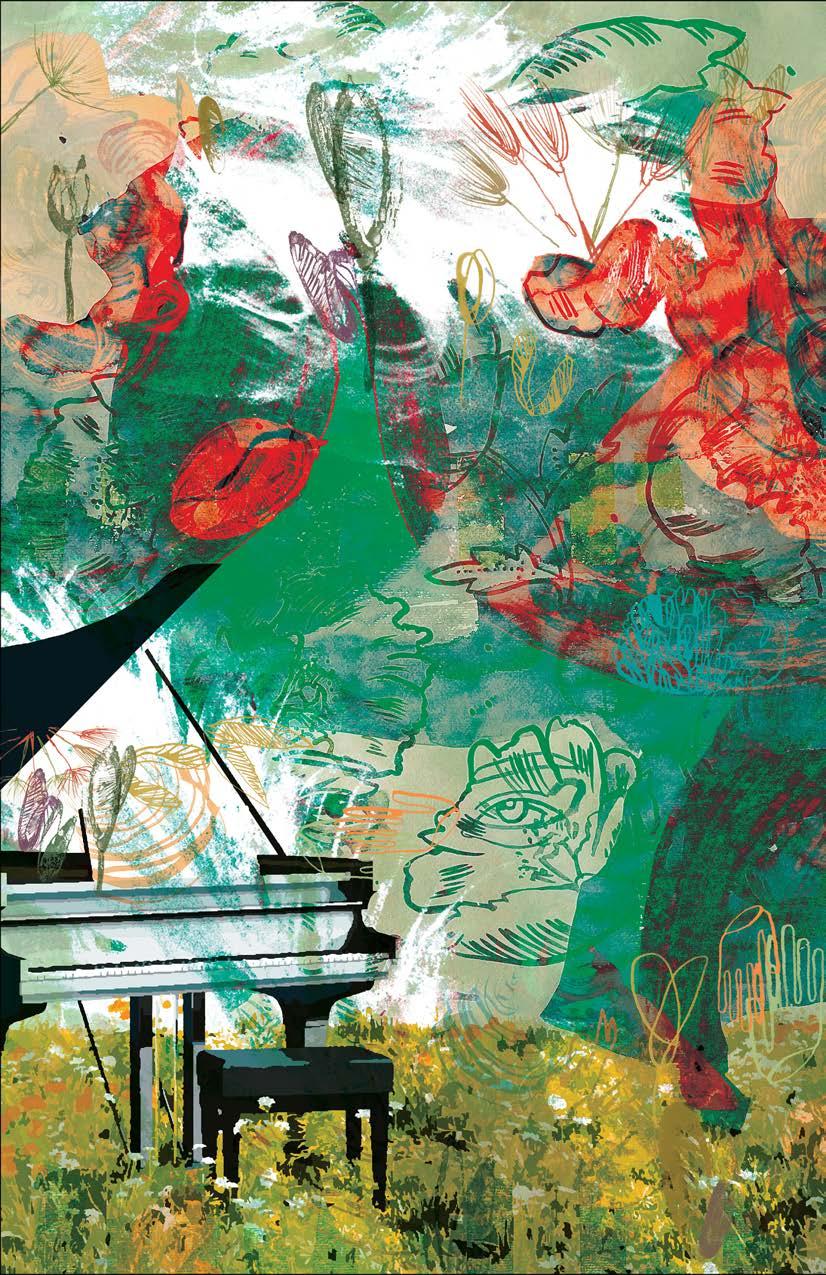
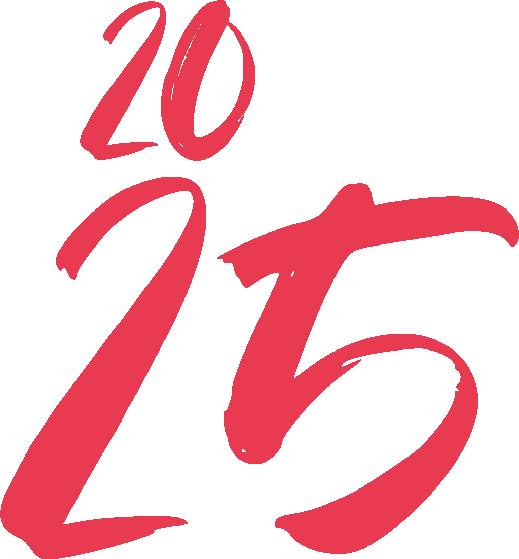





The world’s largest string quartet














by

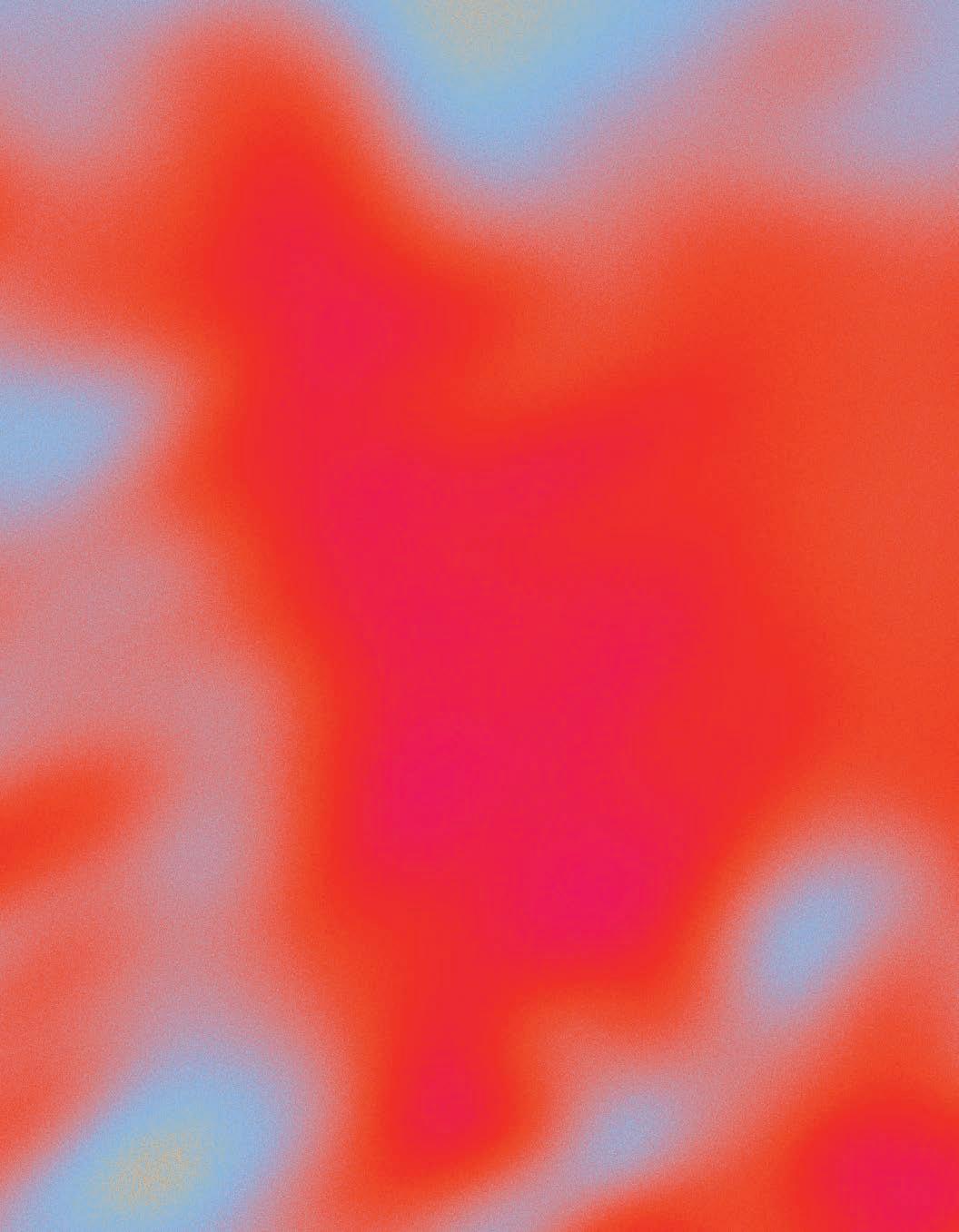
THANK YOU